#Legion: life in the roman army
Explore tagged Tumblr posts
Text
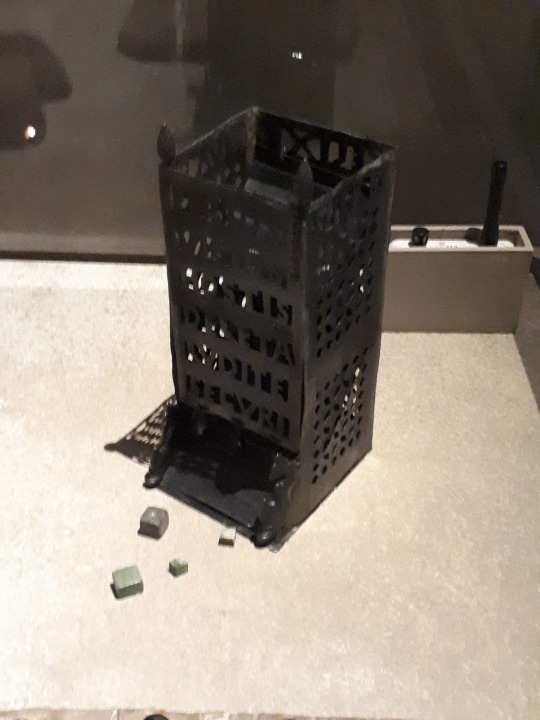
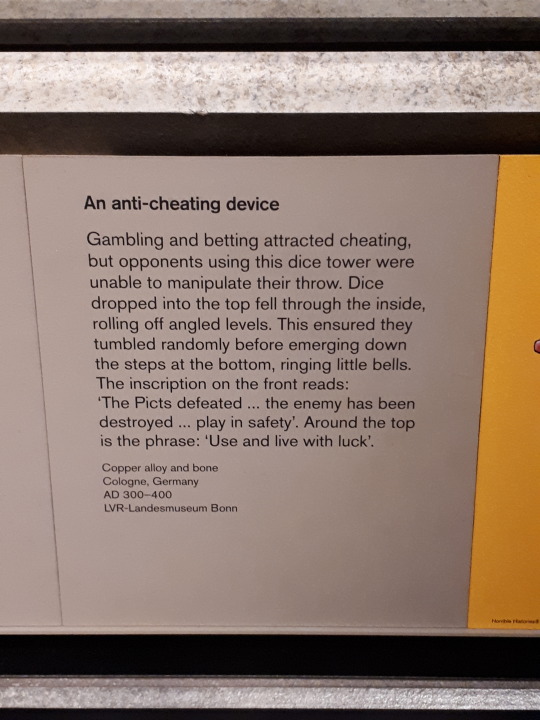
BEST THING IN THE EXHIBIT
15K notes
·
View notes
Text
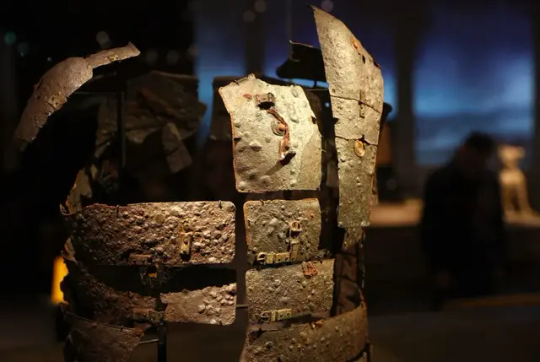
What Was Life Like in the Roman Army?
The British Museum’s New Show Offers a Peek
"Legion" showcases objects including scabbards, coins, and the world's only intact legionary shield.
The viral nature of the term “Roman Empire” makes it easy to forget the trend started because ancient Rome had one of the most unforgettable armies in history. A new show at the British Museum is turning the spotlight on the soldiers that helped build and safeguard Roman rule.
Legion: Life in the Roman Army” transports visitors to the million square miles that was once the Roman Empire to explore its unparalleled military might through the eyes of the people who lived it. The museum already has a dedicated gallery space covering the rise of Rome from a small town to an imperial capital, covering a period of about 1,000 years. But the latest show humanizes that collective power through more than 200 exhibits ranging from soldierly objects to everyday items that capture the lives of citizens living under military rule.
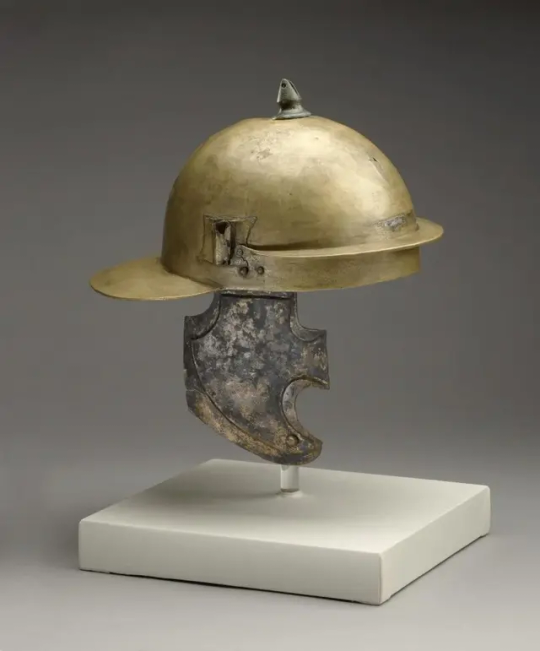
Copper alloy Roman legionary helmet.
“Few men are born brave,” wrote Vegetius in the later Roman Empire. “Many become so from care and force of discipline.” From the 6th century B.C.E., soldiering was a career choice and joining the army came with substantial perks (if you lived), including a substantial pension. Foreigners entering the auxiliary troops could also attain citizenship for themselves and their families.
The show traces the journey of a notable Roman soldier, Claudis Terentianus, following him from his enlistment to his participation in campaigns to his retirement. Along the way, visitors can view the armor and weapons soldiers wielded in battle, from a gilded bronze scabbard to a copper alloy helmet to the world’s only intact legionary shield. Domestic objects such as children’s shoes illustrate the family life of military men; coins and tombstones allude to the cost of the empire’s wars.
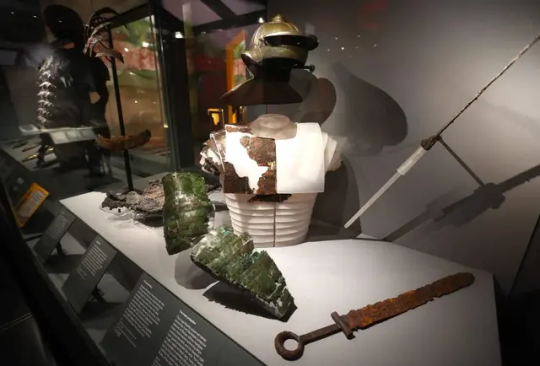
Also included in the show is an ancient Roman arm guard, found in fragments in 1906 and recently reconstructed by the National Museums Scotland—the first time the artifact can be viewed in its entirety in millennia.
“Sword and sandals, helmet and shield are all on parade here as would be expected, but told through often ordinary individuals,” Richard Abdy, the museum’s curator of Roman and Iron Age coins, said in a statement. “Every soldier has a story: it’s incredible that these tales are nearly 2,000 years old.”
By Jamie Valentino.

A helmet depicting the face of a Trojan.
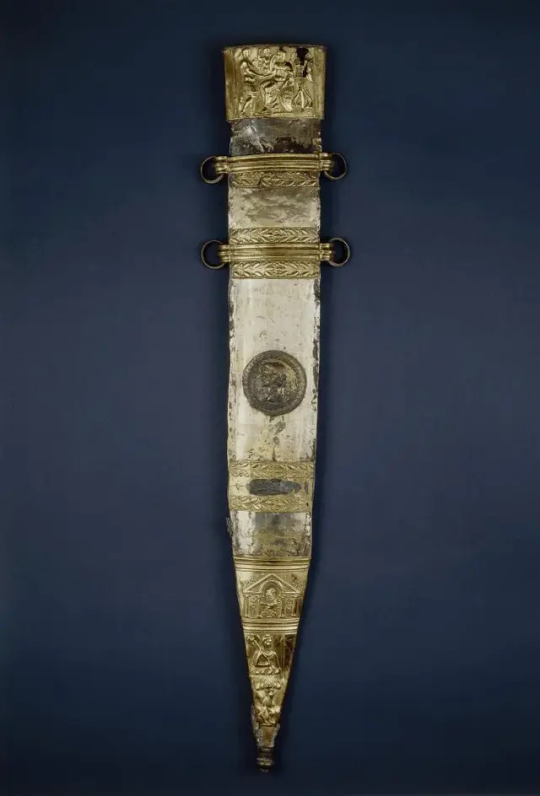
Sword of Tiberius – Iron sword with gilded bronze scabbard.

Tombstone of an imaginifer’s daughter, 100-300 C.E.
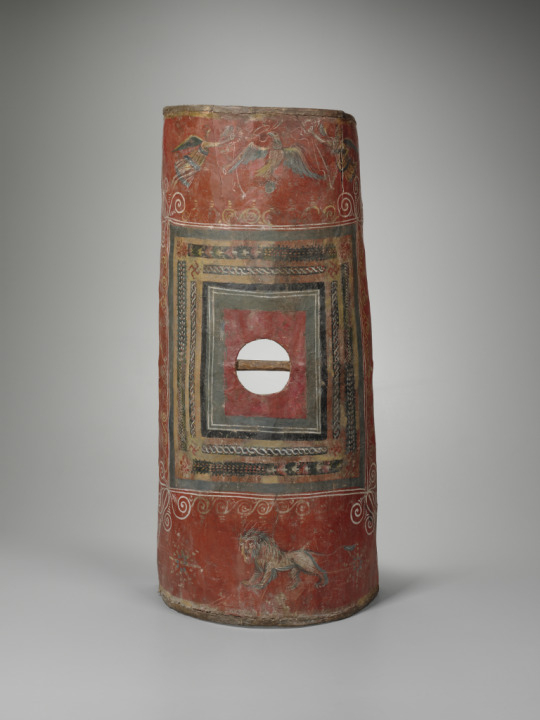
Roman scutum (shield).
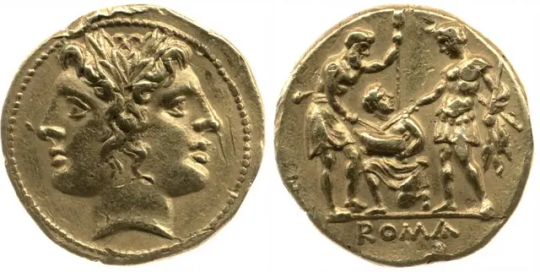
Gold coin featuring an oath-taking scene between two soldiers.
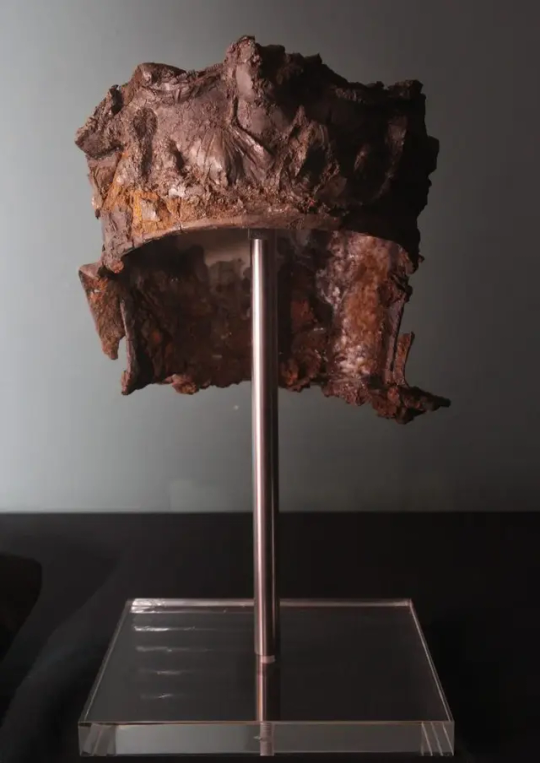
A 2,000-year-old Roman cavalry helmet.
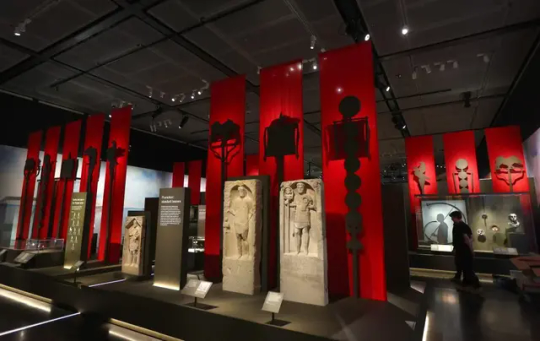
#What Was Life Like in the Roman Army?#The British Museum#Legion: Life in the Roman Army#Claudis Terentianus#ancient artifacts#archeology#archeolgst#history#history news#ancient history#ancient culture#ancient civilizations#roman history#roman empire#roman legion#roman art#ancient art
23 notes
·
View notes
Text
25th February 2024 British Museum: Legion: life in the Roman army Part 8
Nearly there now!
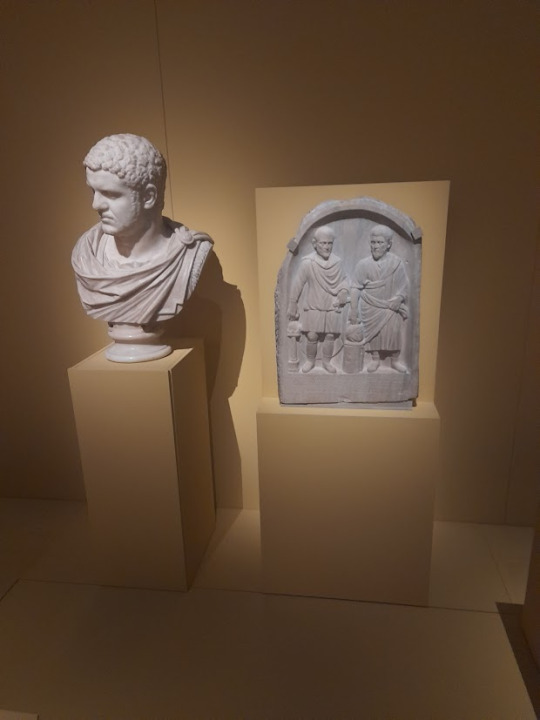
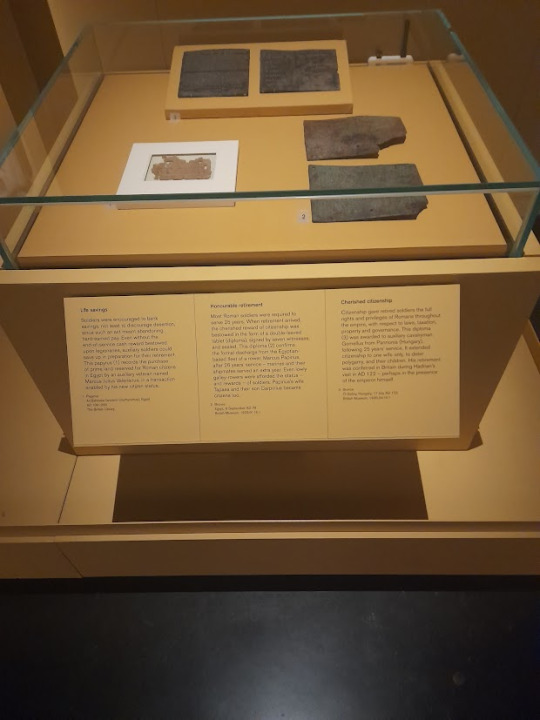
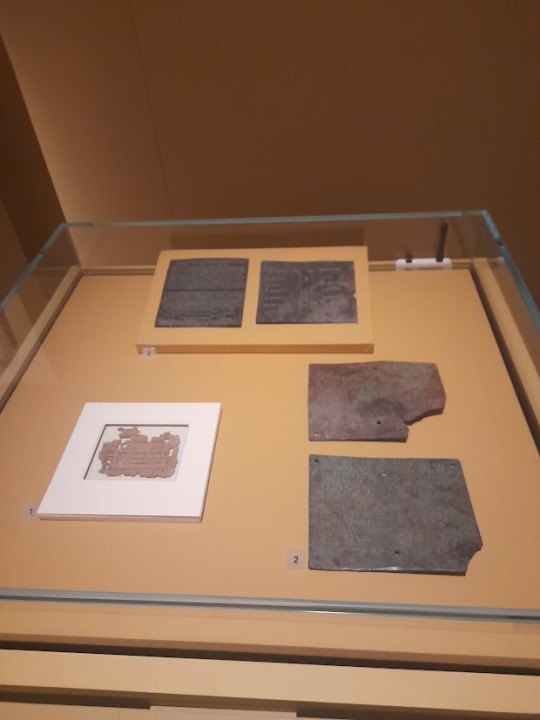
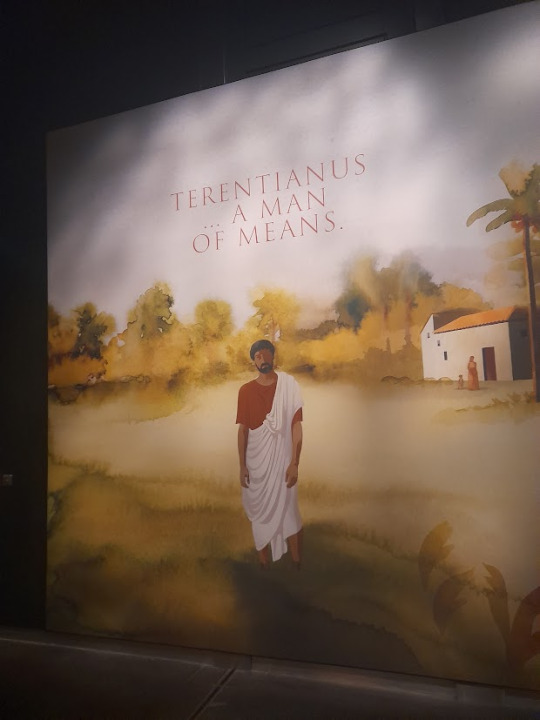
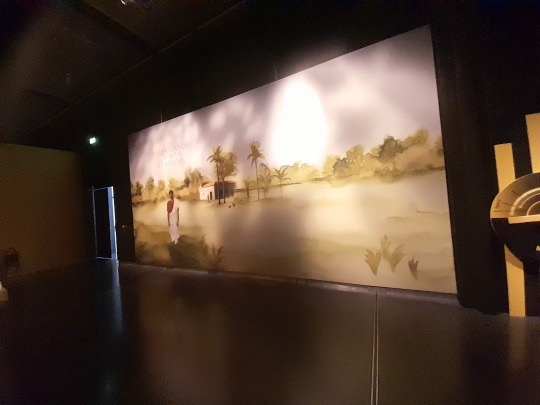
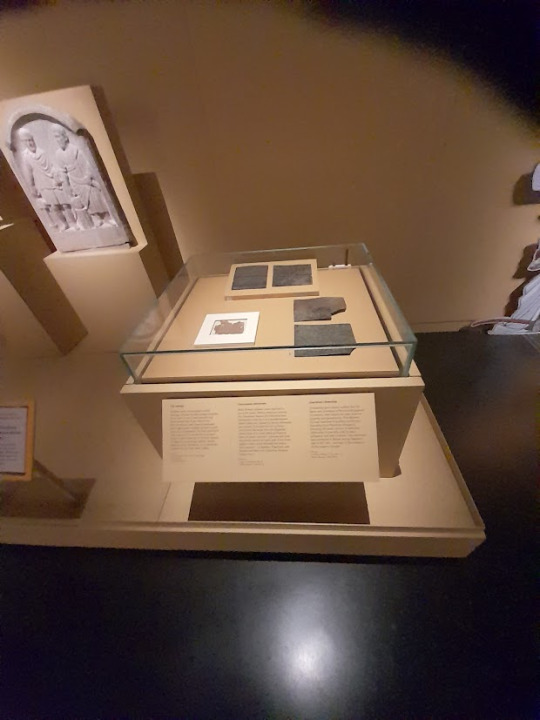
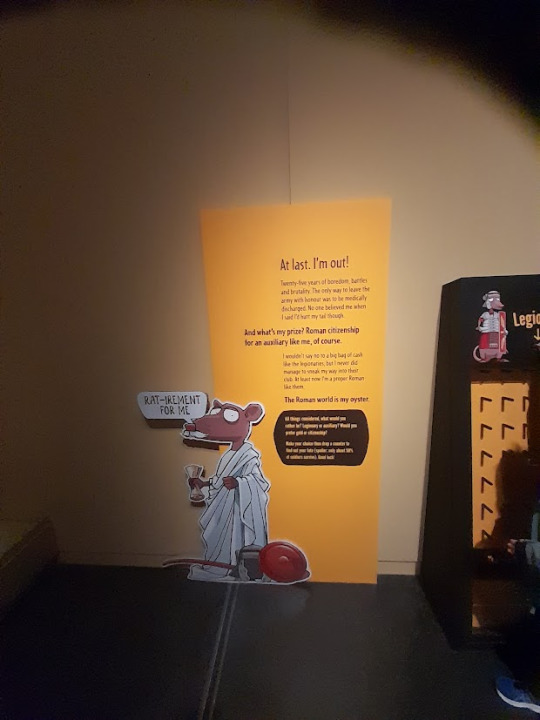
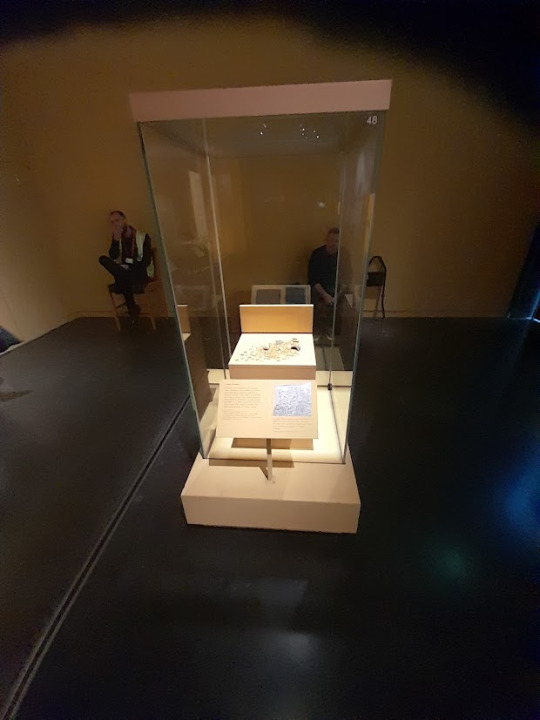
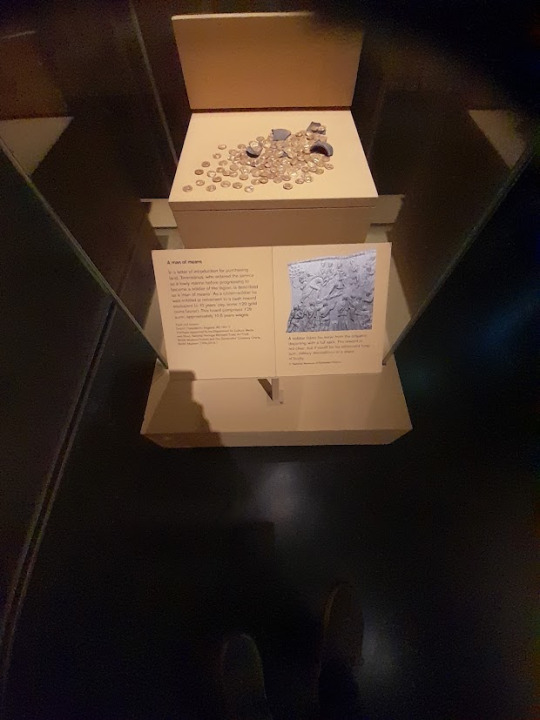
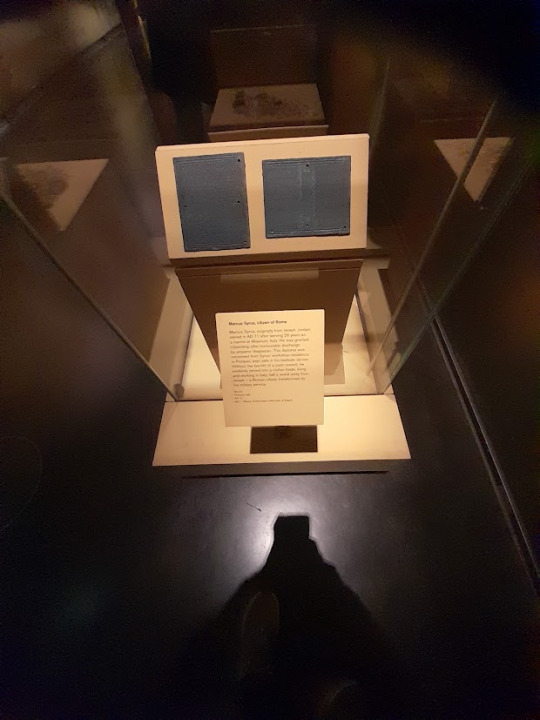

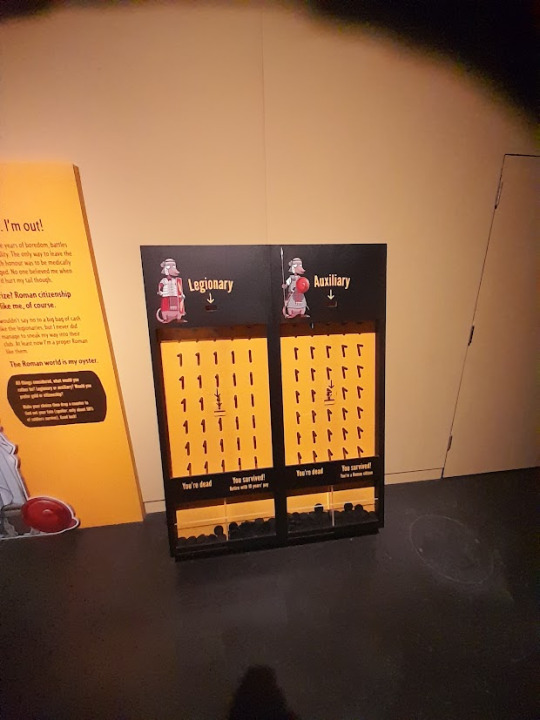






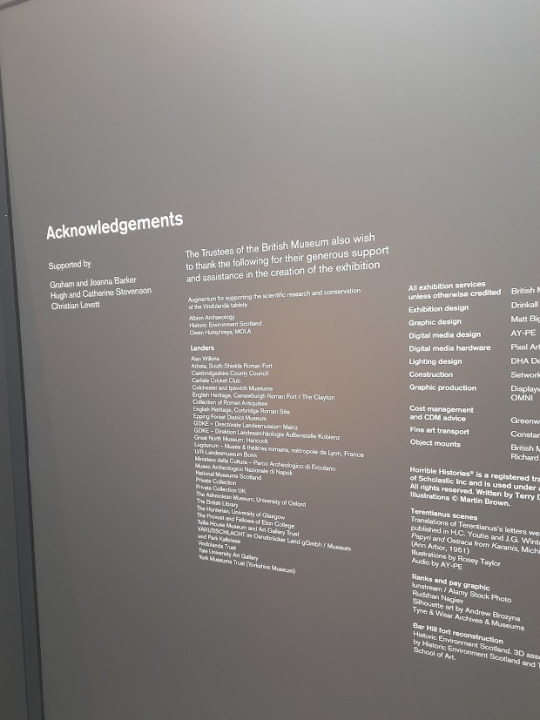

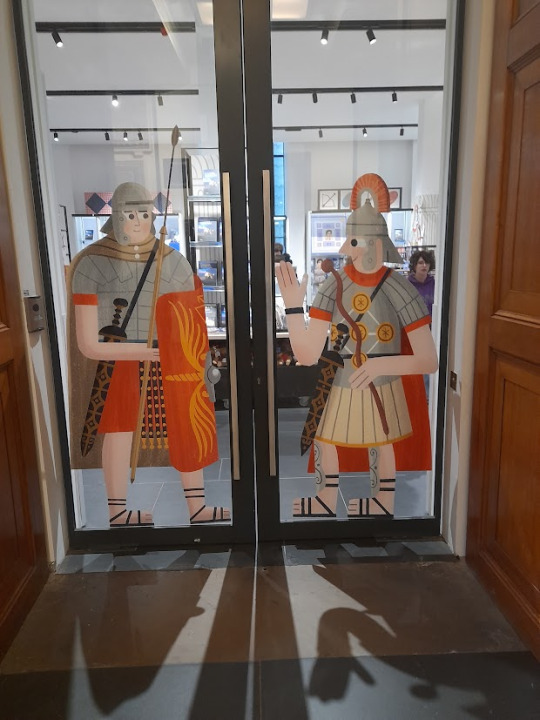



That's it!
0 notes
Text
Legion: life in the Roman Army
(Subtitle: YV decides to go to the British Museum and is very fortuitously surprised by the temporary exhibition there that season)
Back in April of 2024 I happened to be in London for a week and was right in the middle (literally, I had finished Part 2 and had yet to start Part 3) of The Lights That Burn.
During a spontaneous visit to the British Museum I found out they were hosting an exhibition on Roman soldiers (I believe it ran until June that year). Luckily, my companion was game (shocking news, it is not difficult to convince a man to take an interest in the Roman Empire) and there was a lot of fascinating stuff to discover.
Below are some Highly Unimpressive (because of the quality not the content) photographs of Cool Shit and Fun Facts, some of which I found a way to work into the story I was writing, and some that I just enjoyed learning about because Rome Was Very Interesting. (This is probably going to be a few posts worth)





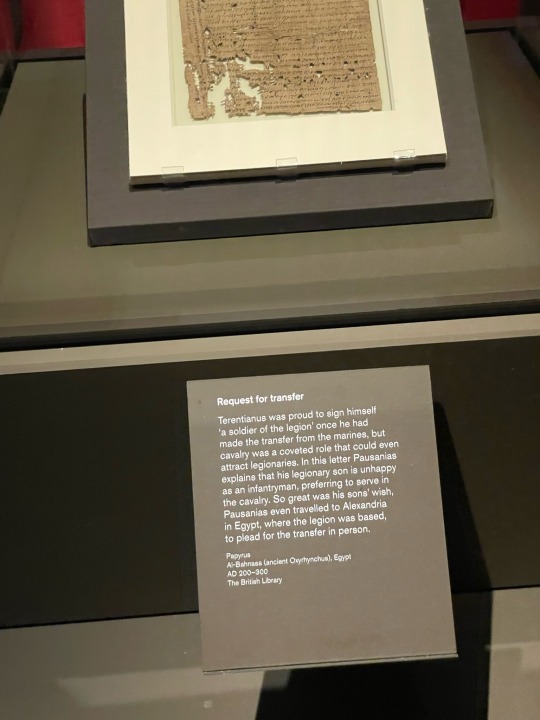



15 notes
·
View notes
Text
THREADS OF FATE

Pairings : pedro pascal (marcus acacius) x megara!reader
Genre : (AU where Ancient Greece and Rome existed at the same time, Hercules/Herakles is the general of Greece, use of Y/N L/N for reader and is the princess of Greece, inspired by Megara, described to have long hair, angst, mentions of death and war, sexual tension?, enemies to lovers trope, Marcus is an asshole at first)
Synopsis : In which the general of Rome captures the princess of Greece.
Word Count : 8.7k
Taglist : @orcasoul
Moodboard :

-----
“FOR THE GLORY OF ROME!”
The general of Rome proudly shouts in victory as his entire army of soldiers and warriors rejoices that Rome has once again won another war.
The air was thick with the stench of smoke and the clamor of soldiers as the Roman legions paraded through the conquered lands of Greece. The earth trembled beneath the weight of their triumph, Rome's banner now draped over the fallen city. The battle had been brutal, the resistance fierce, but in the end, the might of Rome had crushed it all.
Marcus Acacius, victorious and undefeated, rode at the head of his men, his armor gleaming in the dying light of the day. His eyes were sharp, his mind calculating. The campaign had been long and taxing, but Greece was finally subdued. The banners of Rome now flew high across the lands, marking the fall of one of the greatest civilizations to ever rise. And Marcus, he had earned his place as a general in the annals of Roman history.
But as the sun dipped below the horizon, casting a fiery red glow over the battlefield, Marcus’s steely gaze fell upon something that made him pull his horse to a halt. It was not the bodies of fallen soldiers, nor the smoldering ruins of a once-great city that caught his attention, it was the figure of a woman, kneeling amidst the wreckage of what had once been a proud Greek encampment.
Her hair cascaded around her face, her lavender dress stained with dirt and blood. Her posture was one of deep grief, as if the weight of the world had fallen upon her slender shoulders. Her eyes, swollen from crying, stared mournfully at the lifeless body cradled in her arms. The man she held was the very same Greek general who had fought against Marcus, whom he had killed in the final battle.
Her lover.
General Herakles.
For a moment, Marcus’s heart twisted in an unfamiliar way. It was a fleeting emotion, one he could barely comprehend, but it was there. The sight of her, clutching the body of the man who had once been her world, made something within him shift. He had never been a man to pity, but there was something about the raw anguish in her eyes that unsettled him.
The soldiers around him were unaware of the emotional stirrings of their commander, too busy with the spoils of war to notice the woman. But Marcus's mind was far from the victory feast awaiting them back in Rome. He dismounted from his horse with a swift motion, his cloak swirling around him. The rest of his men watched curiously, but none dared to question his actions.
“General.” One of his soldiers ventured cautiously, “We’ve taken the city.”
“I see that.” Marcus interrupted, his voice cold and sharp. He didn’t need the reminders of their conquest. His eyes remained fixed on the once princess of Greece.
Without a word, he began to walk toward her, his footsteps soft but steady on the charred earth. She did not notice him at first, too lost in her sorrow, her fingers gently caressing the dead general’s face, her lips whispering words of mourning. Her eyes were glazed over, lost in the final moment of what she had loved.
It was only when Marcus’s shadow fell over her that she lifted her gaze, her eyes locking onto his with a mixture of disbelief and fury. She recognized him immediately. The man who had taken everything from her, the man whose sword had ended the life of the only man she had ever truly loved. The same man who brought her home into ruins.
Her breath hitched, and the tears that had not yet dried began to spill once more. This time, however, they were no longer the tears of a woman mourning a lover, they were the tears of a princess wronged. Her grief hardened into something darker, more dangerous. The last thing she wanted was to face this man again. She had wished that she would never have to look upon his face again after what he has done.
But here he was.
“What are you still doing here, you monster? I thought you would be long gone by now.” Y/N spat, her voice trembling with a mixture of hate and sorrow. “Your precious Rome has betrayed us. You made sure to rob him of the chance to defend himself, to defend our lands.”
Marcus’s jaw clenched as she spoke. Her words were like daggers, each one striking a place inside of him he didn’t know was vulnerable. The way she spoke, with such raw venom, reminded him of why he had fought in the first place. To keep the world in order. To bend it to Rome’s will.
But the sight of her now, holding her dead lover, pierced through that certainty.
Her words struck deeper than the blade he had buried in her lover’s chest.
“Get up.” He ordered, his voice low and commanding. “We are leaving.”
The soldiers who followed Marcus approached slowly, unsure of what to make of the scene unfolding before them. One of them moved toward Y/N to drag her away, but she didn’t flinch. She didn’t even acknowledge the soldiers at first.
She simply stared at Marcus, her eyes cold, narrowing with every passing second.
“I won’t go with you.” She said firmly, her voice stronger now. “You have already taken everything from me. Do you truly think I would ever willingly follow you?”
Marcus’s gaze hardened. “You will follow me because I command it. You are coming back to Rome as a symbol of the victory of Rome. The world will know that even Greece has fallen to the might of the empire.”
Y/N shook her head, tears streaking down her face once more, but there was no defeat in her eyes. There was only the fire of defiance. “I have no place in your empire, Roman. I am a prisoner of my own sorrow, not yours. Do you think you can break me by forcing me into chains? You have already taken my life from me. I will not allow you to strip me of my dignity.”
The tension between them was palpable, but Marcus’s face remained stoic, unreadable. He had commanded the deaths of many, and had crushed countless opponents beneath his heel. He had brought entire cities to their knees, and this woman, this Greek woman, was no different.
“Chain her.” Marcus ordered coldly. “And bring her to the camp.”
Y/N resisted as they moved to restrain her, but the soldiers were swift and strong. She fought back with every ounce of her strength, but the pain in her chest was too overwhelming, and the soldiers’ iron grip proved stronger than her fury.
She was dragged away, her head held high despite the pain that coursed through her, her thoughts a storm of hatred and grief. Her world had been taken from her once, and now, once again, she would find herself under Roman control.
As the soldiers escorted the princess of Greece toward the Roman camp, Marcus Acacius rode silently beside them, his mind a tangled web of thoughts. He had won his victory, but in the depths of his heart, something unsettled him. Something about her, the way she had defied him, the strength in her sorrow, made him wonder if this war had truly been won.
The road to Rome was long, but the battle within Marcus had only just begun.
-----
The clinking of iron shackles echoed through the entire camp, the rusted irons grills of her cell and the undeniable scent of blood filled her senses. Y/N L/N, her form cast in shadows, paced back and forth in her cell, her mind sharp despite her exhaustion. The faint smell of blood and sweat filled her nostrils, but it was nothing compared to the bitterness that had settled in her chest. The memories of her life before captivity seemed like distant echoes, a cruel reminder of what had been lost.
She thinks back to the abandoned corpse of her husband, General Herakles, a man who had fought valiantly for their people. The now rotting corpses of her soldiers, her people and everyone who she had no choice but to leave behind, abandoning them to the desolate lands that were once the majestic grounds of Greece, her beloved home. But that was before Marcus Acacius had entered the battlefield, before he had torn her world asunder. He had slain her beloved husband in cold blood, a man she had adored and cherished. The very same man whom she was promised to and has shared dreams and promises of creating a brighter future together for Greece. Marcus's name had haunted her every waking moment since, a reminder of the power that men held and the devastation they could leave in their wake.
Her captors, the Roman soldiers, had treated her with the same cruel indifference they afforded to any prisoners of war. They all know who she was. The royal blood running through her veins and the crown she holds high upon her head. But they didn’t give a damn. To them, she was just another woman to be paraded in the gladiator pits, another piece of property in a city overflowing with ambition and lust for power. A reminder of their victory and glory for another war won. A proof of their never ending greed to expand their dynasty like it was the damn plague.
Her hair, tied into a high ponytail, swayed as she moved, the curls at the tips bouncing with each step. The lavender dress she wore clung to her form, accentuating her curves, but it was a mere symbol of her past life, a time before she had been reduced to a mere shadow of herself. The golden strap of her dress dug into her skin, reminding her of the chains that still bound her, metaphorically and physically. Her eyes were sharp and calculating, yet betrayed a deep sorrow that had no end.
Y/N had learned to keep her thoughts to herself. She knew better than to speak freely in this land of men who valued conquest above compassion. But despite her cold exterior, she dreamed of escape, of vengeance, of a world where men like Marcus Acacius did not get to dictate the fates of those they saw as lesser.
The fates had a cruel sense of humor, for now Marcus found himself standing before her. The same woman, who was once the princess of Greece. The same defiance that he has seen in countless prisoners that Rome has taken. And now she is no longer the dignified princess of Greece and was nothing more than a slave, bound to a life that had no dignity.
-----
The grand city of Rome was a sight to behold in the wake of its victory over Greece. The streets buzzed with triumphant energy as the Roman people poured out from their homes, eager to witness the return of their victorious general. Banners flew proudly from every corner, the golden eagle of Rome soaring high above, a symbol of power that now stretched across the lands of Greece. The people roared in approval, their chants rising up in a cacophony of celebration.
Marcus Acacius rode at the head of his soldiers, his armored figure a symbol of Rome’s invincibility. The cheers from the masses grew louder with each step he took. They hailed his name, shouting, "Marcus! Marcus!" The streets seemed to pulse with the energy of the people’s adoration, their voices like a thunderous storm that seemed to echo through the very foundations of the city.
But amidst the jubilation, Marcus’s gaze remained focused, his expression as stoic as ever. Though he basked in the glory of Rome’s triumph, there was something that gnawed at the edges of his mind. The sight of Y/N walking beside him, her chains that he was holding in his very hands, was a stark reminder of the weight of what he had done.
Y/N L/N, the Greek woman who had once held the heart of her fallen general, now stood at the center of Roman pride. Her eyes burned with defiance, her head held high, her posture regal even in the face of captivity. She did not beg for mercy. She did not weep like the many others had when brought to Rome as prisoners. No, she stood as a noblewoman would, unyielding, proud, and fierce in her own sorrow.
Her chains clinked with every step, the iron biting into the skin of her wrists, but she didn’t flinch. To the Roman people, she was but a symbol, an object of conquest, a mere prisoner to be paraded before their eyes. Yet, the princess of Greece was not so easily broken.
Her lavender dress, though now stained and torn from the journey, still held an air of dignity. The golden straps, now dulled from the harsh journey, glinted faintly as the sunlight caught them. Her hair, once immaculately styled, now fell in, tangled waves, but it didn’t matter. She was still beautiful, still a force to be reckoned with. Her eyes, though filled with the remnants of grief, held an unshakable strength that no Roman could take from her.
Marcus’s fingers curled around the chains that connected them, the weight of them in his hand a constant reminder of his authority, but even as he gripped them, he found his attention drawn to the woman beside him. There was something about the way she carried herself, as though she were not a prisoner at all. The crowds around them may have been celebrating Rome’s triumph, but Y/N’s quiet defiance was a challenge, one that lingered in the air like a slow-burning flame.
The people of Rome could see nothing but a prisoner at Marcus’s side, a broken woman who had lost everything. But Y/N knew better. She knew her worth, and she would not let these people forget that she was not just a casualty of war. She had been a figure of nobility, a woman with a past that was far more complicated than they could ever know. And in her heart, she would continue to hold herself as such, no matter the chains that bound her.
“Do they think you’ll beg for mercy, Greek?” Marcus’s voice cut through the sounds of the celebration. His gaze was still forward, but his words were pointed, as though testing her resolve. “You may be a woman of Greece, but here, you are nothing but a prisoner.”
Y/N didn’t turn to him, her steps steady as she walked beside him, feeling the weight of the eyes upon her. She had no intention of letting her spirit be crushed by this Roman parade. Her eyes scanned the crowd, the faces of the people who watched her as though she were an exhibit, a trophy to be admired.
“I will not beg for mercy.” Y/N replied, her voice low but firm. She met his gaze with a quiet intensity, her eyes never wavering from his. “And you will not break me. You may have conquered Greece, but you will never conquer me.”
Marcus’s jaw tightened at her words, but he didn’t respond. He didn’t need to. The people around them cheered louder, a deafening roar rising up from the masses as they reached the grand stairs leading to the Imperial Palace. There, a large crowd had crowded for Marcus’s triumphant return, where he would receive the accolades of Rome’s Emperors, senate and the people alike. The princess of Greece, however, was not to be treated as a guest. She was led to a smaller, less ceremonious area, far from the glory that awaited her captor.
The grandeur of the Imperial Palace was like no other in the empire. Marble columns stretched high into the sky, their surfaces gleaming with the brilliance of Rome’s wealth and power. Statues of past emperors lined the hallways, their stern faces gazing down on all who dared to enter. The palace buzzed with the preparations for the grand assembly where Marcus Acacius, the hero of Rome, would present his proof of conquest, Y/N L/N, the last of Greece’s nobility, captured and soon brought before the Emperor Brothers as the symbol of Rome’s undeniable triumph.
Marcus stood at the entrance of the lavish hall, his gaze focused on the grand throne of the imperial seat. The twin brothers, Emperor Geta and Emperor Caracalla, sat upon their thrones, their regal figures imposing in their splendor. Their eyes shifted to Marcus as he entered, the rumble of murmurs from the attendants around them quieting instantly at the sight of the victorious general. But their attention soon shifted toward the figure standing at his side.
Y/N stood tall and unwavering, her chains still hanging at her wrists, her head held high with defiance as ever. Her eyes, burning with an indignant fire, glanced across the room, meeting the Emperor’s gaze with unwavering poise. She did not flinch, not for a moment, under the weight of the attention that fell upon her. Her lavender dress, now even more torn and sullied from the journey, clung to her lithe figure. The golden spiral pendant on her hips glinted faintly, despite the dirt that had stained her skin. Even now, she is still beautiful.
Radiantly, stubbornly beautiful.
The Emperor brothers exchanged a look, their gazes moving from Marcus to Y/N. It was Geta, older of the two, who broke the silence first, his eyes widening as he took in her appearance. He had seen many prisoners in his time, but none quite like this woman. Her beauty was undeniable, and it sent an unexpected thrill through him.
“Ah, General Acacius.” Emperor Geta said, his voice smooth, though his eyes lingered a moment too long on Y/N. “You have indeed brought us a most... captivating prize. This one…” He motioned towards the princess with a nod of his head, his tone shifting into something more indulgent, “...is truly the epitome of Greek beauty, is she not?”
Y/N’s eyes flashed with a barely contained contempt, her lips twisting into a thin smile that was anything but friendly. The chains clinked with every slight movement of her hands, but she ignored them as she met Geta’s eyes directly.
“Compliments from a man such as you mean nothing.” The princess replied coldly, her voice laced with acid. “Your words may flatter, but they do not change the fact that you are a man who needs a woman's beauty only to satisfy your own insatiable ego.”
Geta blinked, momentarily taken aback by her harshness. But he refused to let her words strike him down. He leaned forward, attempting to regain his composure.
“Such a sharp tongue.” He smirked, clearly undeterred. “I admire it, Greek. You should be honored by the attention I offer you.”
Y/N recoiled, the disgust clear in her eyes. She took a step back, a deliberate action that sent a subtle but distinct message. The chains that bound her wrists clinked loudly, marking her defiance.
“I am no toy for your amusement.” She shot back, her voice unwavering. “I will not sit idly by and be paraded as some mere decoration for you to ogle. I am a woman of Greece, a noblewoman, a princess and I will not allow you or your Roman bastards to treat me as something less.”
The room fell silent, the tension thick and palpable as her words hung in the air. Marcus, who had been standing off to the side, watching the exchange, remained unmoved. He had anticipated her defiance, expected it even, but there was something in the way she spoke that made the situation feel more personal.
Caracalla, the younger brother, shifted in his seat, his eyes narrowing as he observed the scene. He was more outgoing than Geta, but now he was deadly serious for some reason, his face impassive, his posture rigid. There was something cold in his gaze as he appraised Y/N.
“Enough, brother.” Caracalla spoke, his voice low and firm. He turned his attention to Marcus, the weight of his authority suddenly felt throughout the room. “You’ve brought us the woman as a symbol of Greece’s fall. Let her beauty be the final tribute to their defeat. But do not forget her place.”
Geta bristled at his brother’s intervention, but he quickly quelled any sign of irritation. He turned to Y/N, who had yet to take her eyes off him, her defiance burning like an unquenchable fire.
“You are lucky to stand here.” Geta said, his tone now tinged with frustration. “You may be a prisoner, but your beauty alone might grant you some measure of respect. Do not make the mistake of forgetting where you are.”
Y/N’s lips curled in a bitter laugh, her gaze never wavering from Geta’s. “Respect?” She scoffed. “You think I would ever accept respect from the likes of you, a man who hides behind the power of an empire to get what he wants? You are nothing but a coward, wearing a crown that is built on the suffering of others.”
The words struck like a slap, and for the first time, Geta’s expression faltered. His lips parted, as though ready to retort, but no words came. He was taken aback, not by her beauty this time, but by her sheer audacity. Y/N L/N was not like any prisoner he had encountered.
Marcus stepped forward, his voice firm, interrupting the tense silence that followed Y/N’s insult. “Enough.” He commanded, his eyes narrowing as he addressed both emperors and the princess of Greece. “She may be a prisoner, but I will not tolerate her disrespect toward you, Emperor Geta.”
But Geta raised a hand, signaling Marcus to silence himself. “It is not her disrespect I care for, General.” He said slowly, his gaze still focused on Y/N. “It is her spirit that intrigues me. She may not be a toy, but she certainly is a challenge.”
Caracalla leaned forward then, his eyes narrowing with cold calculation. “Perhaps it is that very spirit that will make her valuable to us, Marcus. Not only as a symbol, but as a reminder to Greece of the cost of defiance.”
Marcus nodded, but his thoughts were elsewhere. Y/N had defied not just the Roman soldiers who had captured her, but the very authority of the Emperors themselves. The fire within her, that unyielding strength, was both admirable and troubling. He could not deny that it intrigued him, and perhaps even unsettled him in ways he had not expected.
“We will see if she can be tamed.” Marcus said under his breath, his gaze lingering on Y/N, who stood before the Emperors with her head held high, still refusing to bow to any of them.
The crowds around them continued their celebration, oblivious to her defiance, to the fire that still burned in her heart. They cheered for Marcus Acacius, the man who had brought them victory, the man who had crushed Greece beneath Rome’s boot. But as he took his place at the center of the stage for the Emperors to reward him for his victory, his eyes flickered briefly back toward Y/N. In the midst of the grandeur and adoration, something within him stirred. She was different from the other prisoners he had taken. She wasn’t broken. She wasn’t like the others who had begged and cried for mercy. There was a strength in her—a fire—that he had not expected.
As the evening wore on and the celebrations continued, Marcus could not shake the thought of her. He had conquered Greece, but in Y/N L/N, he had found a challenge unlike any other, a challenge that could not be measured in battles or bloodshed.
For in the end, it wasn’t Greece that had fallen. It was something far more elusive. Something he would need to reckon with in the days to come.
And Y/N, even in chains, had left her mark on him.
-----
The grand marble halls of Marcus Acacius’s home were starkly different from the humble yet regal surroundings Y/N L/N had once known in Greece. Here, everything gleamed with the opulence of the Roman Empire, gilded statues of past emperors staring down from every corner, while the walls were adorned with intricate mosaics depicting Roman conquests and celebrations. The air was thick with the scent of fresh flowers and the ever-present undertone of wealth.
It was within this imposing estate that Y/N found herself, though not as a guest, not as a noblewoman of Greece, but as a lowly servant—reduced to the status of a mere scullery maid.
The irony was not lost on her.
Once, she had stood proudly by the side of a general whose name echoed through the halls of Greece. She had been a woman of power, of influence. Now, her wrists were bound by the very chains she once wore as a prisoner, yet now they were metaphorical as well as literal. The chains of servitude were a constant reminder that she had fallen far from grace.
Y/N was led through the grand halls, the whispers of Roman servants and soldiers falling silent at the sight of her, the once proud and beautiful woman now relegated to the task of cleaning, scrubbing, and serving the very man who had stripped her of everything she held dear. She walked with her head held high, though the weight of it all bore down on her. Her eyes never once flinched from the ground, for she would not give them the satisfaction of seeing her beaten down.
“Clean the kitchens. Prepare the meal.” The steward ordered coldly, handing her a wooden bucket and a scrubbing brush. Y/N didn’t respond, her expression unreadable, her thoughts a turbulent storm inside her mind. The very thought of serving Marcus Acacius, the man who had caused the death of her lover and conquered her homeland, was a bitter pill she could hardly swallow.
But she would not show them weakness. Not here, not in Rome.
With measured steps, she moved to the kitchens, the servants parting before her as though she were some shadow from the past, lingering just outside their world. The clang of pots and the simmer of the fires seemed distant, muffled by the thoughts clouding her mind.
As the princess of Greece set to work, scrubbing the floor with practiced precision, her thoughts wandered back to the day she had been captured. She had been clutching her husband’s lifeless body in her arms, her grief as palpable as the air she breathed. And then, the soldiers had come for her. They hadn’t allowed her the dignity of mourning. They had ripped her away from the battlefield, from her husband’s side, and dragged her to this cold, heartless city, forcing her to exist as nothing more than a trophy of war.
She had been nothing but a prize.
Her thoughts were interrupted by the sound of footsteps approaching, heavy and deliberate. Y/N’s heart quickened for a moment, but she steeled herself, returning to her task. She would not look up.
“Still working, I see.” Marcus Acacius’s voice rang out from the entrance, smooth and commanding.
Y/N’s body tensed. She recognized his tone, the authority in his voice. But she refused to give him the satisfaction of seeing her lookup, so she kept her gaze fixed on the floor as she continued to scrub.
“You know, Greek, I could have chosen any number of positions for you.” Marcus continued, his voice tinged with something unreadable, his footsteps approaching closer. “But I thought this would be the most... fitting.”
Y/N’s breath caught in her throat for a brief moment before she exhaled sharply through her nose, still not looking at him. “Fitting?” She repeated, her voice low but sharp, laced with disgust. “You think it fitting to reduce me, a Greek royalty, to the level of your servants? To have me crawl on the floors, cleaning after the very man who has destroyed everything I once knew?”
Marcus chuckled, a sound that did not reach his eyes. He moved to stand just behind her, watching her work. “It is nothing personal, Greek. It is simply the way of things. Rome is the victor, and the spoils of war are always claimed by those who have the strength to take them.”
Y/N paused for a moment, the brush still in her hand as her mind raced. She wanted to lash out, to throw every insult she had ever known in his face. But she knew better. She was not yet broken, not yet defeated.
Without turning to him, she replied, her voice steady, though tinged with defiance. “And I suppose you believe this will make me accept my place here. As your slave. As your property.”
Marcus did not respond at first. The silence between them stretched long, almost painfully, until Y/N felt his presence move, his hand grabbing a hold of her face as if to force her to turn and look at him.
She froze, but only for a moment.
Slowly, she lifted her gaze to meet him, her eyes locking onto his with a piercing intensity that could cut through any pretense of control he might have. His expression was unreadable, but there was a glint in his eyes that was unmistakable, a recognition of the strength he still held over her.
“You are my property, Greek.” Marcus said, his voice quiet, yet it carried the weight of something deeper. Something more complex than he had let on. “But you are here because I choose to keep you. You will remain under my roof, in my service, and you will learn your place in Rome, as all those who come here must.”
Y/N’s pulse quickened, the words slicing through her like a dagger.
“You may have conquered my homeland, Marcus Acacius.” She said, her voice soft but firm. “But you will never conquer me. I will not bow to you. Not ever.”
For a moment, Marcus stared at her, his face unreadable. Then, without a word, he turned and walked away, his steps echoing in the quiet room.
Y/N, left alone in the kitchen, let out the breath she had been holding. Her heart raced, and her fingers gripped the scrub brush so tightly that her knuckles turned white. But there was no break in her posture, no crack in the armor she had carefully crafted. She would never be a slave, not in spirit, not in heart. Not while there was breath in her body.
She would bide her time.
Rome may have won the battle, but Y/N had not yet given in. She was still the proud woman of Greece, and that, above all, was something they could never take from her.
-----
The following days blurred together, each one melding into the next like the rhythmic motion of a pendulum. Y/N L/N, now a permanent fixture in Marcus Acacius’s home, continued her duties as a maid, a servant, words that burned her tongue each time she was forced to acknowledge them. The once proud princess of Greece had been reduced to the very thing she had despised most, and yet she did not break. Her heart remained unyielding, a shield against the constant reminder of her fall from grace.
Marcus Acacius, ever the commander, never let her forget what she had lost.
He would pass her in the hallways, his eyes sharp as they raked over her form, and often, his gaze lingered just a little too long, as if he were savoring the power he wielded over her. His presence was a constant shadow over her existence, a reminder of the world she had once been a part of and the one she now lived in. He would sometimes stand by her as she worked, arms crossed over his chest, his voice dripping with mock sympathy.
“Do you miss it, Greek?” He would ask, his tone tinged with something like amusement. “Your home, your people, the life you once had?”
She would not look up at him, nor would she allow her hands to tremble. She would continue to clean, to cook, to serve as though the weight of his words didn’t crush her heart. But deep inside, they did. They always did.
“I miss nothing.” She would say, her voice as cold and steady as the marble floors she scrubbed.
“Nothing but my dignity, which you’ve stolen.”
He would laugh at her response, the sound rich and full of mirth, as though her defiance was something to be enjoyed. It was never the same with him. With every word, every glance, Marcus reminded her that she had been conquered. That she was nothing more than a prisoner of war.
Yet Y/N never let him see how much it hurt. She couldn’t. If she did, it would be the last victory he would have over her.
Her life in his home was a series of monotonous tasks: cleaning, preparing meals, ensuring the needs of his household were met. There were moments when she thought she might slip into despair, moments when the weight of it all threatened to drag her under, but she would not allow it.
Instead, she found solace in the little rebellions, the small moments where she could still maintain some semblance of her former self. She refused to let her appearance suffer. Each day, she would pull her hair into the same high ponytail, the curls at the tips still framing her face with defiance. She kept her eyes sharp, and though they were often filled with the storm of emotions she refused to acknowledge, they never betrayed her.
Her lavender dress, the fabric faded and worn, still clung to her form in the same graceful way it always had. She did not let her clothing become as tarnished as her soul had been made to feel. Even in this prison, she was still Y/N L/N, and she would not let the Romans take that from her.
As for the other servants, they treated her with a mixture of pity and fear. Some avoided making eye contact with her, while others whispered behind her back, no doubt curious about the woman who had once been a princess in Greece and now slaved away in the kitchens of the man who had brought her to this state. Yet Y/N paid them no mind. They were as much a part of the system that had enslaved her as Marcus himself.
There were times when the bitter taste of loss would surge within her, when she would remember her husband, her beloved general, his body cold in her arms, the blood of her people staining her hands, and the sight of the Roman soldiers advancing, led by Marcus Acacius, ready to tear apart everything she had known. In those moments, the anger within her would rise like a firestorm, and she would clutch the scrub brush in her hands, tightening her grip until her knuckles ached.
One day, after Marcus had casually reminded her of the “grace” he had shown in taking her as a servant rather than disposing of her like the many other prisoners of war, Y/N could no longer hold her tongue.
“I hope you are satisfied.” She spat, her voice dripping with venom. “The great Roman general who has everything, and yet still takes pleasure in tormenting those beneath him. Have you no shame, Marcus?”
He stood there, arms folded, watching her with an unreadable expression. “Shame?” He asked, his voice low and dangerous. “You think I should feel shame for winning a war? For doing what was necessary for Rome’s future?”
Y/N’s lips curled into a sneer. “You have won your war, Marcus. But you will never win what truly matters.”
He stepped closer to her, the tension between them crackling in the air. “And what is that, Greek? What could you possibly think I could still lose?”
She met his gaze with defiance, not an ounce of fear in her eyes. “You may have taken my land, my home, my husband, my people.” She said, her voice firm despite the tightness in her chest. “But you will never break me. Not like you think.”
For a moment, neither of them spoke. The silence was thick with the weight of their unspoken words. And then, as if sensing that this was a battle he could not win, Marcus gave a low laugh.
“You’re stubborn, I’ll give you that. But stubbornness won’t save you, Greek. Not here.”
Y/N’s lips curved into a small bitter smile as she turned away to continue her work. “Maybe not.” She said, “But it will make it harder for you to enjoy your victory.”
Marcus didn’t respond, but the silence between them held a tension that was almost palpable. He may have conquered her body, her lands, her people but he had yet to break her spirit.
And as long as that spirit remained unbroken, Y/N L/N would continue to hold her head high, even in the face of defeat. The proud princess of Greece would not be erased, not by the man who had taken everything from her.
The battle was not over. Not yet.
-----
The air in Marcus Acacius's chamber felt heavier than usual that evening. He stood before the polished bronze mirror, adjusting his armor with careful precision. A meeting with the Emperor Brothers, Geta and Caracalla, awaited him in the Imperial Palace, and this time, the stakes felt higher than they ever had before. The whispers of Rome’s power growing ever more insatiable echoed in the back of his mind. He had been to countless meetings before, each one a seamless blend of politics and strategy, but something gnawed at him now.
Something unsettled him.
He adjusted his golden breastplate, the eagle of Rome etched onto the surface gleaming in the dim light. His soldiers, his trusted men, awaited him just beyond the door, ready to follow him to the heart of power. He took one last look in the mirror, making sure every part of his uniform was immaculate, before he turned sharply and left, his boots echoing in the corridor.
The Imperial Palace loomed ahead, its towering columns and marble statues a testament to the glory of Rome. He entered the grand hall where the generals and high-ranking soldiers stood in quiet anticipation, all waiting for the Emperor Twins to make their appearance. The atmosphere was thick with tension, a mixture of respect and trepidation filling the space.
When Geta and Caracalla finally entered, the room fell silent. The emperors were imposing figures, their presence commanding attention without the need for words. The men in the room straightened in their positions, and Marcus instinctively joined them, standing tall as he awaited their instructions.
Emperor Geta, always the more vocal of the two, stepped forward and addressed the gathering. “Today, we discuss the future of Rome.” He began, his voice carrying through the hall like the roll of thunder. “Our recent victory over Greece was a success. The fools didn’t see through our plans during our times of alliance with them. And because of that, we had our perfect opportunity to devise our revenge against them. And now, we have come out victorious thanks to our beloved General Acacius.”
Marcus, though silent, could feel the weight of the words settle in the pit of his stomach. An alliance with Greece? He had been a part of that conquest, had witnessed the fall of the Greek resistance, but something didn’t feel right upon knowing that Rome and Greece once had an alliance before he led the war against them. Why wasn’t he made aware of this?
Just as he opened his mouth to voice his concerns, Geta raised his hand, signaling for silence. His voice was quiet, almost soothing compared to his brother’s.
“The alliance was, indeed, a symbol of strength and prosperity for Rome.” Geta said, “But there were... complications we must address. It seems that Greece, despite the appearance of peace, still harbors those who wish to undermine our authority. The idea of a peaceful future with them was... flawed. So we decided what needs to be done.”
The room tensed at his words, but it was not the words themselves that caused Marcus to freeze in place. It was the shift in the air, the realization that the peace spoken of was nothing more than a deception..
Caracalla’s gaze shifted to the gathered officers, and his voice grew colder, more commanding. “Rome will never be a weak empire. We will not allow Greece to escape the consequences of their actions. We have made a pact with them, until the time for peace is over.” He smiled darkly. “We have declared war on them. Not because we must, but because we can.”
The words were like a thunderclap in Marcus's mind. He felt the ground beneath him shift, as though the earth itself had split in two. The shock that followed left him numb. Betrayal. It was not the Greeks who had broken their word, it was Rome.
“I am not sure I understand, my Emperor.” Marcus said, his voice betraying the confusion that churned within him. “We were allies with Greece. The alliance was forged to ensure peace, was it not? Surely…”
“Surely?” Caracalla interrupted, his smile twisting. “Do you not understand, Marcus? Power is not to be shared. We, Rome, cannot allow another empire to rise higher and shine brighter than ours. The Greeks were weak and blind, but they are proud, and that pride makes them dangerous.”
Marcus’s mind reeled. He had been the instrument of their destruction, the force that crushed their armies, and now he understood. It was never about peace. It was about control. The so-called alliance of peace was simply a tool to lure Greece into a false sense of security, so that they could strike. It was never about honor. It was about dominance.
“Are you telling me that all of this was a lie?” Marcus asked, the weight of the truth settling over him like a suffocating blanket. “That the alliance was nothing more than a ploy to deceive Greece into lowering their guard?”
Geta’s eyes narrowed. “It was a necessary deception.” He replied. “Your task was simple, Marcus, to win the war for Rome. The rest is beyond your concern. We finished what was started, and Rome will remain supreme.”
Marcus stood still, his chest tightening with the unbearable truth. He had been the one to end the war, the one to force Greece to its knees, and now he saw it for what it was: a grand scheme. They had never intended to honor their word. It was always a game, a twisted game where the lives of thousands were simply pawns on a board.
But in that moment, something deep within Marcus shifted. A cold, simmering fury began to rise within him, tempered by a gnawing sense of guilt. He had been used, but worse, he had participated in the destruction of a people who had done nothing to deserve this.
In the midst of the Emperors’ plotting and the conversation that followed, Marcus’s mind wandered back to Y/N. Her defiant eyes, her proud posture despite her circumstances, it was as if she knew, deep down, that the war had been a lie all along. That the Romans had never come to liberate, but to conquer. And in that, perhaps she had seen through the facade long before he had.
As the meeting drew to a close, Marcus left with a growing sense of disillusionment. The promise of Rome’s strength and prosperity felt hollow in his chest. The empire he had sworn to serve was no different than the villains he had fought against.
It was a painful realization, one that twisted the very foundation of his beliefs. The man who had fought for peace now found himself tangled in a web of lies.
And as the Emperor Twins reveled in their power, Marcus Acacius stood on the precipice of his own understanding, he was no longer certain where his loyalty lay.
-----
The days in Marcus Acacius’ villa were slow, stretching like the long shadows of a fading sun. Y/N had grown used to the monotonous rhythm of servitude, the quiet indignities, the whispered snickers of other servants, the weight of a life reduced to menial tasks. She had expected cruelty from her Roman captor, expected to be treated as nothing more than a disposable relic and reminder of the people the general had conquered.
But what she had not expected… was kindness.
It started subtly.
The harsh orders ceased. No longer was she forced to scrub floors until her fingers bled or serve the Roman general in humiliating silence. Her tasks became lighter, her burdens lessened.
Then came the offerings.
A warm cloak placed over her shoulders on a particularly cold morning. A fresh loaf of bread left on the table when he knew she hadn’t eaten. A goblet of wine pushed toward her at supper, his dark eyes watching, waiting.
Y/N ignored it all. She refused to accept his feigned kindness, refused to acknowledge whatever twisted sense of guilt had taken root in his mind.
She was no damsel in distress.
And she certainly did not need Marcus Acacius, her enemy, her captor, to start playing the role of her reluctant savior.
On the fourth day of his strange, unspoken shift in behavior, Y/N had finally had enough.
She stormed into the atrium of the villa, where Marcus stood in quiet contemplation, staring out into the courtyard. His dark hair was disheveled, his tunic unadorned, the regal formality of Rome momentarily shed. He did not turn when she approached, though he undoubtedly heard her.
Y/N crossed her arms over her chest, her lavender dress swaying as she came to a halt beside him. “You need to stop.”
Only then did Marcus shift his gaze to her. His brow furrowed slightly. “Stop what?”
“This.” She gestured between them, frustration flaring in her eyes. “The kindness. The leniency. The…” She exhaled sharply. “...the pity.”
His expression remained unreadable. “You mistake my actions for pity.”
“Oh, please.” She scoffed, rolling her eyes. “You’ve treated me like an insignificant speck of dust ever since you dragged me to Rome. And now, suddenly, you’re giving me warm cloaks and extra food? What am I supposed to think?”
Marcus studied her for a long moment.
Finally, he spoke. “Perhaps I was wrong to treat you as nothing.”
Y/N’s breath hitched, just barely, just for a second. But she quickly masked it with another scoff. “A little late for that realization, don’t you think?”
Marcus turned to fully face her now. “I will not ask for your forgiveness, nor will I insult you again by pretending that you deserve it.” He exhaled, tilting his head slightly. “But I will not treat you as if you are less than what you are anymore.”
She hated the way his words stirred something unfamiliar in her chest, something she quickly smothered beneath her fury.
“I do not need your guilt, Marcus Acacius.” She said, voice sharp as a blade. “I do not need your atonement. I am not some tragic, delicate flower you must tend to.”
His lips twitched in what might have been the ghost of a smirk. “No.” He agreed. “You are not.”
Y/N blinked, caught off guard by his easy agreement. She had expected him to refute her, to insist upon his newfound chivalry. But no, Marcus Acacius was not a man prone to embellishment.
“I am simply attempting to make amends.” The general said.
She let out a humorless laugh. “Amends?” Her eyes gleamed with something fierce, something unbroken. “You cannot undo what has been done. You cannot undo Greece’s fall. You cannot undo…” Her voice faltered, for just a breath. “...what you took from me.”
The air between them grew heavy. Marcus did not look away.
“I know.” He murmured.
For a moment, neither of them spoke.
Then, Y/N let out a sharp exhale, stepping back. “Just stop it.” She muttered, turning away from him. “I don’t need your kindness. It’s wasted on me.”
As she walked away, Marcus watched her retreating figure, something unreadable flickering across his face.
Because, despite her words…
He wasn’t so sure if he'd ever stop.
The days that followed their confrontation were strange, to say the least.
Y/N had expected Marcus Acacius to return to his usual self, stoic, commanding, the ever-dutiful general of Rome. But instead, he had become… irritatingly attentive.
He had not lessened her work, she was still a slave in his household after all but there was a shift in his demeanor, a softness in his approach that made her wary. He no longer barked orders at her like some barbarian. Instead, he asked if she was well. He offered her food from his own table instead of letting her eat with the other servants. He even, gods forbid, tried to make decent conversation.
Y/N, of course, was having none of it.
"Oh, so now you suddenly care about my well-being?" She remarked one evening, crossing her arms as she leaned against the doorway of the grand dining hall.
Marcus, seated at his table, merely sighed. "I have always cared for your well-being, Y/N."
She scoffed. "Oh, yes, I can see that. How thoughtful of you to drag me from my home, chain me like an animal, and make me scrub the floors of your villa. Truly, a paragon of kindness, General."
He set down his goblet, leveling her with an exasperated stare. "I did not know the truth then."
"And now that you do, what? You think offering me grapes and wine will undo what you've done?" She sauntered closer, plucking a grape from his untouched plate and popping it into her mouth. "Hate to break it to you, General, but I am not so easily won over."
A smirk tugged at his lips. "No, I suppose not."
Y/N expected him to snap, to command her back to work. Instead, he just watched her, as if memorizing every quirk of her expression, every flicker of defiance in her eyes. It was unnerving.
And yet… she found herself playing into it.
If he was going to act the part of a repentant soldier, she would make him work for it.
The next morning, Marcus found himself on the receiving end of Y/N’s pettiness.
His prized war cloak, the one gifted to him by Emperor Caracalla himself, was now mysteriously missing. In its place, draped over his chair, was a ratty, threadbare shawl from the servants’ quarters.
"Where is my cloak?" He demanded, pinching the bridge of his nose.
Y/N, passing by with a tray of fresh fruits, barely batted an eye. "Oh, you mean that garish red thing? Looked awfully dirty, so I threw it in the trash."
Marcus narrowed his eyes. "You expect me to believe you suddenly care about the cleanliness of my wardrobe?"
She offered him a saccharine smile. "Of course, Dominus. It is my duty to serve, after all."
He exhaled sharply. "Y/N…"
But she was already walking away, humming a Greek melody under her breath.
Later that evening, as Marcus settled into his chambers, he discovered yet another one of Y/N’s little games.
His usual goblet of wine? Replaced with water.
His ceremonial sandals? Mysteriously swapped with a pair that were two sizes too small.
His bedding? Missing entirely.
Marcus sat on the edge of his bed, rubbing his temples, as the realization dawned upon him, this was not a battle he could win with brute force.
Y/N L/N was a force unto herself, stubborn as a mule and twice as cunning. If he truly wished to atone, to earn her trust… he would have to fight a different kind of war.
A war of patience.
And gods help him, he had never fought a war this maddening.
#chat and chill#x female reader#x reader#pedro pascal#gladiator 2#gladiator ii#gladiator movie#gladiator ll#pedro pascal gladiator#marcus acacius#marcus acacius x reader#general acacius#general marcus acacius#marcus acacius x you#marcus acacius fanfiction#marcus acacius x female reader#marcus acacius x y/n
126 notes
·
View notes
Text
HoO redo-rodeo
So I've been having a lot of thoughts about HoO characters that I'm never going to get around to Actually Writing, so here we go:
The 7 demigods of prophecy being an uneven mix of Greek and Roman annoyed me, so here we have:
Greek: Percy, Annabeth, Piper
Roman: Jason, Hazel, Frank
Nonhuman: Leo
GREEK
PERCY
The Ascendant Godling.
His character arc is him unknowingly becoming a god, slowly drifting away from the mortal perspective, burning up his mortality faster and faster, sacrificing the last of it to strike the finishing blow to Gaea.
Keeps the Achilles Curse and we get to see it acting as a curse, how it cripples his stamina outside of active combat with adrenaline to keep him going. Needs so much more sleep and food, but while on the streets takes ambrosia/nectar to keep awake and moving. Amounts that would kill any other demigod, that he would never take if he had his memories.
Starts ending fights faster becauase he can't afford to draw them out with talking or negotiation, so falls into lethal intensity survival mode very quickly.
Arrives at Camp Jupiter earlier (timelines are messy anyways, but he should spend more time at Camp Jupiter before the Quest). I just want actual description of the bathhouse, the infrastructure, the routines and attitudes. I want to know what makes the Greeks and Romans different!
Goes by Perseus, because that's what monsters and gods know him as. Also for fun omens about being The Destroyer.
Camp Jupiter assumes they're being tested at first, but then assume that he's a god made mortal so Reyna claims his service for the Legion. She sends him on the Quest under Frank as his Task.
Becaue he's Greek, a very powerful unknown demigod older than the usual initiative and unknowingly becoming a god, he's uncomfortable with the crowds of Roman demigods and legacies, so spends a lot of time in the Temples and quiet places talking to naiads and fawns. Put into trainign as a priest for Neptune, to appease the god and keep Percy out of the way. Builds the understanding of Octavian's huge political power as Augur.
ANNABETH
The Powerless Demigod, the Strategist.
The only one without a clearly divine power, but she's spent her life training to make up the difference. Athena Cabin pours over battle plans and mythology books, anything to get an edge. She doesn't get magic weaving powers, but they all learn and practise weaving to honour their Mother's domain. Big ephasis in Athena Cabin of Athena always being the best and the wisest and Right and that whould never be questioned (which drove initial conflict with Percy in first series over parent's rivalry). Put a lot of stock in making Athena proud of her.
Character arc: after being disowned, forced onto a suicide quest that's killed countless siblings before her while on a world-saving deadlined Great Prophecy Quest, with her only magic support disenchanted... Annabeth becomes disillusioned with Athena as a goddess and a mother (because love and respect are earned, not entitled by blood... and with the example of Sally during interactions while searcing for Percy...). She disavows herself as a Child of Athena.
After Gaea: maybe she becomes a priestess to Percy after designing him a temple. Joins Jason as architect to his Potifex Maximus duties, eventually made Immortal as Architect of Olympus (because there's no way she finished redesigning Olympus in the months between the Titan War ending and Percy disappearing).
Tartarus: during the fall, she blindly sews together some of Arachne's tapasteries in the pitch blakcness to make them a parachute to halp survive the landing.
PIPER
The Titan Army Traitor.
Maybe she never got taken to Camp, maybe she did and immediately ran away from it that night or the next day rather than stay at the Hermes Distaster Relief Shelter Cabin. Either way, she gets picked up by the Titan Army cause. People who help her, train her, sympathise with feeling abandoned by the gods to the mercy of monsters. They don't have much, but they're fighting for a better world. They're family. Then things start to change; Luke becomes more Kronos and demigods start to go missing, some on Missions, some to shadowy corners and the satisfied grins of the monsters who were also angry at the gods and should be their allies. Maybe she even met Selena a few times fro Charmspeak training and listened to her sister share her worries and doubts about the Cause... then the Princess Andromeda blows up and she realises the other side are aiming to kill opposing demigods just the same as monsters. She runs before the Battle of Manhattan.
In Lost Hero, she doesn't get immediately Claimed at Camp and knows exactly why. While no one is looking, sacrifices something precious to her to Aphrodite, maybe with a vow of loyalty or something? She is very, very afraid of the gods.
Character alteration: Mean Girl. She puts on a defensive mask of vanity and sensuality, learned for the cameras and honed under the expectations of the Aphrodite Child stereotype. Runs cons with Leo as the face of the opperation, uses perfuumes to hide demigod scent.
Arc: learning to let down her walls and trust the team to have her back. Also, an earned (on both sides) reconicilliation with Aphrodite.
Embodies Aphrodite Areia, the war aspect of her mother's domain. Uses a spear and wears her cabin's enchanted pink armour. Maybe she also gets Katoptris, but parallels of Selena by training with Clarisse for the spear.
Abilities: Charmspeak, empath & emotional manipulation, voice mimicry and minor visual shapeshifting ability (ie. Mystique) for physical features (semi-involuntary with emotional surges, anger makes her teeth sharpen and nails grow points etc.). Innate sailing affinity as part of Aphrodite's domains, a way to connect with Percy.
ROMAN
JASON
The Olymian Champion.
A messy mix of feral wolf and absolute rule stickler. Was raised by Lupa and then learned how to be in human society through the Legion, through the lense of that being human pack dynamics. Human: polite, controlled, often wearing a small smile with no teeth, opperates by strict rules with Reyna offering the more flexible alernative. More than a bit OCD.
Puts the expectations of others above his personal desires and is pushed to be a puppet of the gods. Hera's Champion, Eagle Child of the God King Jupiter, Wolf Cub of Lupa (claimed as her child like Romulus and Remus, calls her mother). Blesing of Lupa gives him slightly pointed ears and teeth.
Appearance: platinum blonde hair that's almost like white lightning, electric blue eyes that glow when using powers, always carries glasses in a special armoured case and is farsighted (because he focuses too much on the bigger picture to see the immediate),
Arc: learning to live life outside of the rulebook. Letting out more wolfish behaviour and being comfortable in himself.
Conflict with Percy as caught between human knowledge of 'powerful stranger of a foreign pantheon' as a threat to protect the Pack against... and wolf instinct subconsciously recognising Baby God with Roman conditioning to kneel in deference.
HAZEL
The Living Ghost.
She came back to life, but spent decades dead and in Asphodel, so different from two-second deaths of Gwen and Jason. Hazel is a dead soul in a living body.
Physical: cold to the touch and always absolutely silent. Someone next to her hears her take a breath before speaking and is unsettled to realise they heard it because it's almost like he wan't breathing before (she was, but less than a normal human and completely inaudibly). She watches others with an like a owl-like unblinking stillness, a dark form with glowing eyes like an inverse of her father's sacred barn owl. I kind of also want her skin to be cracked through with veins of immortal gold, because her body was remade to return to life, not just resiscitated, so she would have early practice with manipulating the Mist to look normal.
Emotional: Quiet and kind but ruthless, strongly justice-oriented. Visciousness is its own mercy, especially in combat. Makes a judgement and cannot be swayed from her ruling, but is fair in learning all the contextual information before making decisions about people. A step out of rhythm with the rest of the living.
Hazel's Curse: Thanatos' chains are made out of Stygian Iron and Stygian Ice (frozen Styx water), which tries to rip her dead soul from her living body, freezes her hand to the chain. Frank sacrifices some of his life to her (via stick) to melt her hand off the chain, lighting up her gold-veins with blinding light and breaking her Curse (I just want them holding hands and glowing the gold of gods, this couple of a mortal and a ghost).
Abilities: Pluto domains over earth riches, death and agriculture. Cannon abilities, but after SoN wears cuff bracelets inlaid with gem shards that she can pull out and whip around like a deadly ribbon of shrapnel. Being semi/formerly dead, Hazel has a heightened sense for living things, extending to something agricultural (idk, but would be useful against Gaea, yeah?).
Weapon: Scythe, weapon of Proserpina (Persephony) and death connotations. Would just be cool to have her on Arion with a scythe like a golden Grim Reaper and it diversifies the weapons in the 7.
FRANK
The Cursed Legacy.
Frank is a 4th gen Legacy whose paternal Great Grandfather was a demigod son of Mars, but also secretly Legacy of Neptune by his ancestor marrying Neptune-demigod Shen Lun. Each generation has strived to earn patronage of Mars, but the blessings passed by blood have gotten weaker every generation, indicating losing divine favour. Family blames it on the dishonour of Shen Lun and his Neptune-blood sullying the bloodline.
Frank is essentially mortal, but high social class from heritage of Mars-bloodline-favour and lineage service to Legion.
He can't have any amborsia or nectar, but can carefully use the Roman alternative cures like unicorn draught.
Frank has been trained since childhood to be able to keep up with first-gen demigods in combat and uphold (secretly, to regain) the honour of Mars to the Legion. Would not be an outcast if he wasn't friends with Hazel, but he chose friendship with her over social standing/reputation.
Ended up in 5th Cohort through Octavian's machinations to 'improve the cohort standard', actually a subtle blackmail message that he knows about the fading Favour.
The stick: since Shen Lun (and his dishonourable Legion discharge), every member of his line has been born with one. Using the shapeshifting ability directly correlates to it 'burning' by dissolving in golden light. It also turns strands of hair white like the effect of holding the Sky.
There's not enough divinity in his body to handle the power in his blood. Every use kills him a little bit more, but is it dishonourable to prioritise selfish survival over the safety of his comrades? The survival of the Quest?
NONHUMAN
LEO
The Fading Spirit, the Healer.
Leo is a daimon (immortal spirit with power varying from satyr to minor god like Thanatos), a rustic fire spirit called a Dactyl (insert dinosaur jokes here). Predate satyrs and oreads, male counterpart to Hekaterides and often conflated with Kouretes. Species has almost entirely Faded into extinction.
Dactyls are ancient smiths and healing magicians, mostly associated with Hephaestus like satyrs are with Dionysus, but some individuals with others (like Paionios with Asclepius) always in a supporting role. Children of Anchiale, titanness of the warming heat of fire.
Pretends to be a demigod, disguised by Piper's perfume from Coach Hedge, after praying to Hephaeustus gets Claimed by him as a patron. Leo is Sammy and knew Hazel, protected her from monsters, left Alaska after her death, still has the diamond she gave him.
Abilities: metalworking, fire, maths, cannon abilities, healing and wild dancing.
Role: support role and essentially non-combatant, as no natural fighting ability/instinct like demigods. Engineer on the Argo II and team healer
Calypso: Leo has a lot of life experience all around the world, remebers Olympus being in different places and can catch her up of the world she's missed. By the end of the Quest, Leo is no longer in danger of Fading, Calypso is still immortal and their being together is a more equal deal.
Epilogue:
List of Immortals by the end of the series:
Percy (god), Annabeth (similar to Ariadne), Leo (daimon, but partnering with Calypso would become more level with minor god than satyr).
Other characters: Calypso, Grover (Lord of the Wild), Thalia (Huntress), Tyson, Bob and Damasen eventually.
Possibly Hazel and Frank, acting as soul guides/ psychopomps, otherwise Elysium. Possibly Jason for services as Pontifex Maximus in reviving belief of minor and/or Fading gods and daimons, but he'd probably prefer going to Elysium than staying with the Gods forever. Piper... I can't think of a significant divine link, so probably to Elysium. The immortal among the 7 would visit the Underworld souls, of course.
Camp development:
Romans: Become more inclusive, social development. Opening to trade with Greeks and through them also the Egyptians etc.
Greeks: Become more stablished, societal development. Colonize Ogygia (Calypso tethered it to Long Island) as a safe haven to live in full-time, start building a full Greek society.
#heroes of olympus#cannon rewrite#character redesign#percy jackson#annabeth chase#piper mclean#leo valdez#jason grace#hazel levesque#frank zhang#titan army piper mclean#nonhuman leo valdez#god percy#mortal frank#riordanverse
55 notes
·
View notes
Text
One of the light-touch worldbuilding/storytelling/dramatic irony moments I really enjoy in Fallout: New Vegas is everything to do with Aurelius of Phoenix, the Legion Slavemaster operating Cottonwood Cove. Nested bit here, right? On first glance it seems like psuedo-Latin gibberish, something grandiose but divorced from meaning, like a lot of the Legion guys- but then you do the double take and realize it's a cognomen, a nickname Romans would receive based on great achievements or conquests-e.g. Scipio Africanus- and that implicitly this is the guy who helped sack the actual former city of Phoenix in Arizona. Stealth Future-imperfect trope, disguised at first glance because "Phoenix" is already a kind of grandiose mythologic-sounding word. And when you realize that, right, it's suddenly very funny, for the same basic reason The Republic of Dave is funny- grandiose terminology juxtaposed with a mundane name from the world we recognize. If it were Aurelius of Boise, Aurelius of Cincinnati, right, there are cities you could use in the pairing that would cause it to parse as much more of an explicit gag. So now it's silly in the way everything about the Legion is silly. But then it wraps back around to actually kind of unnerving, because first off, basically it's an offhand implication of something very nasty having gone down in Phoenix, A City From Real Life That We Recognize, in order for him to have gotten a whole Cognomen out of it. And second, it's obviously not a coincidence that his name doesn't sound dumb. Caesar isn't gonna let a subordinate quote-unquote "earn" a cognomen unless it's useful to him, unless it enhances the brand somehow, and having a guy named "Aurelius of Phoenix" walking around, well, it does do that! It feels calculated. It's not the kind of name that's downstream of cultural decay and half-remembered information. It's another example of how Caesar micromanages his slave army down to their very names, and how he lifts random superficial elements of Roman culture on an ad-hoc basis without integrating any of it on a deeper level. A lot going on, with this one guy's goofy name!
#fallout new vegas#caesar's legion#late night posting so not fully endorsed#but yeah there's a lot going on here#fallout#fnv#fonv#thoughts#meta#effortpost
718 notes
·
View notes
Photo

Soldier and Society in Roman Egypt: A Social History
This is a highly recommended book for anyone who wants to learn more about Roman Egypt. It examines the role a Roman soldier played in Egypt from the reign of Augustus to Diocletian.
For many years, there have been many studies done on the Roman army. Many of the general studies have been popular, however, the more narrowly focused aspects of the Roman army have not gained as much attention. This book focuses on what it was like to be a soldier in Roman Egypt. Richard Alston, Professor of Roman History at the University of London, explores the cultural, economic, and legal aspects of a soldier’s life in this province. It gives readers a new insight into Roman Rule in Egypt after the time of the Pharaohs had long since passed. It is targeted at scholars and general readers alike.
This book is a good overview of the Roman army in Egypt from Augustus to Diocletian. In the first chapter, the author introduces the current state of the field. Roman military historians like Spiedel and Bierly have assumed the goals and ultimate role of militaries have been constant throughout history. Richard Alston criticizes this assertion and reminds us that we cannot assume that the Roman army behaved like modern armies. Alston seeks to identify “what the army was for, what the soldiers did, who the soldiers were and how the army related to the civilian population” (6). He argues that the Roman army in Egypt was organized similarly to other provinces. Furthermore, to a degree, every province had an exclusive cultural record. Chapters Two through Six examine aspects such as where the Roman legions were stationed in Egypt, how soldiers were recruited and how they retired, soldiers’ and veterans’ legal status in Roman Egypt, their daily activities, and how this impacted the Egyptian economy. Each chapter outlines the scholarship for these issues and how they can be improved. In the seventh chapter, Alston focuses on how soldiers interacted with civilians in the village of Karanis in the Fayum. He chose Fayum in northwestern Egypt because it was there that many veterans and soldiers settled. Generations of military families trace their ancestry there, too. Roman soldiers and veterans enjoyed a privileged lifestyle and belonged to the upper level of society. They interacted with the civilians and even married into their families. Alston concludes with the claim that the veterans stationed in Karanis were not the foremost in Romanization. However, it remained a relatively large village despite the minority of Romans.
Chapter Eight is brief and talks about the army reforms of Diocletian and the impact it had on the Roman army in Egypt. Chapter nine is a final chapter that summarizes Alston’s conclusions about Roman Egypt with how the army had an impact compared to other provinces such as Britain. He analyzes this from the evidence at the Vindolanda fort near Hadrian’s wall.
There are two detailed appendices, one offering a significant evaluation of the documentary evidence for each cohort and legion stationed in Egypt and the other reviewing the archaeological evidence for the Roman army stationed in Egypt. The illustrations of five forts in this section provide the reader with helpful visuals of Roman architecture.
This is a seminal work and is highly recommended. The conclusions in each section of the book vary depending on the available evidence. Military historians and general audiences alike will benefit from it. This book is different from other works on Roman Egypt because it focuses on the role of the Roman army in that time. Roman Egypt gives us insight into how the land of the Nile changed after the pharaohs, and this book is a perfect addition.
Read More
⇒ Soldier and Society in Roman Egypt: A Social History
46 notes
·
View notes
Text
The more you think about Jason Grace's life, the more fucked up it gets.
Like, the whole "joined Camp Jupiter as a three year old" thing. We already know Camp Jupiter is fucked up because it places heavy importance on a child army, despite having plenty of demigod adults at hand, but they straight up recruited a three year old into the military. He showed up and got promptly stuck in a barrack for the rest of his childhood.
Like, why?? Why on earth would they do that instead of giving him to someone in New Rome to raise and inducting him into the legion at a respectable twelve??
And who raised him anyway?? A rotating cast of nineteen-year-old demigods?? His bunkmates in the Fifth?? If he was a young teenager I could see that, but he arrived when he was three, was he even potty-trained??? Did he just grow up being educated by bored teenagers and ghosts, watching as demigods arrived and served and retired, being told that he had to be the greatest of them all?? Did he have any other children to grow up with?? Did the legion even consider him different than the other recruits, or did he have to shovel unicorn dung when he forgot his phonics and live with the constant threat of perhaps being sewn into a bag of weasels??
I find it odd that Jason, as a demigod who grew up in a demigod's world, doesn't have his unique perspective explored more. I find it especially odd that the difference between his childhood and everyone else's is ignored. However difficult and varied everyone else's backgrounds are, they've at least attended a school. They had parents, and family, and a home, at least at one point. They had mortal toys and dwellings and communities that weren't merged inextricably with the myths. They knew where they came from. Do you think Jason, with his powerful, kingly father and impending destiny, ever felt like he didn't know who his family was?
I also find it strange that he doesn't seem to have a very wide network of friends from Camp Jupiter? He has Reyna, who he trusts and works with and depends on. He lists Hazel and Frank among his friends, but they look up to him as a role model. He mentions Bobby and Dakota familiarly, but never again. He's familiar and on good terms with basically everyone—but the only person he seems to consider as a close friend is Reyna. And that wouldn't be odd if he hadn't grown up at Camp Jupiter. He doesn't seem to have any constant companion—anyone he considers his family until he meets Leo.
Maybe he and Leo bonded so well because they both knew what it was like to grow up transiently. To have any constant in your life, and know that the day you would move on or they would move on was fast approaching. Maybe the reason he looked at Camp Half-Blood and admired how united and familial they seemed, and wished Camp Jupiter could be similar, was that he could see in them the family he wished he had.
Honestly, I feel like meeting Thalia should have left him in a lot more turmoil than it did. He grew up with no family but a god for a father, and here's a person who wanted him. Someone who always wanted him because he was Jason, and not the demigod son of Zeus. Maybe even someone to whom he mattered more than his destiny.
I really, really wish we'd gotten to see more of the contrasts between him and Percy. He is explicitly the Romans' version of the hero Percy is, except he's the hero first, and the person second. Jason did everything right! He did everything perfectly, and Percy still got where he did without being trained for it his entire childhood. He's got such a better reason to resent him than "bad vibes". They could have been foils for each other hhhhhhhrngh.
Just. This lonely, idolized, child soldier's life hurts me.
#and honestly i want to know all about his life before HOO#all the quests he went on! the friends he made! what shaped him into the person he is today!#his identity problems should run deeper than “i like the greek way but i was born a roman” and “i find it difficult to process the kind of#person my mother was"!#riordanverse#heroes of olympus#jason grace#heros of olympus
335 notes
·
View notes
Note
I personally have always felt that, on Jason's end, the rivalry he bad with Percy was done to like meet the expectation of his role S a son of Jupiter. He doesn't even know how to have a genuine rivalry because he's all in his head.
I dunno I might be talking outta my ass
i understand how it comes across that way. honestly, that's probably how rick wrote it. "well these two are kids of the big three, gotta put some tension there."
he clearly didn't think about percy and jason as three-dimensional characters that could have a rivalry grow naturally between them. he thought a rivalry would just be a flat plot point and made something up.
the rivalry should have been jason trying to fill percy's shoes at CHB for months, and still falling short because he's not thinking of percy as a person who can't be replaced rather than just an empty leadership role that needs to be filled.
the rivalry should have been jason learning that percy became praetor after spending less than a week total at CJ—he was literally on a quest 90% of the time. no matter how much he helped in the battle at the end of the book, jason wouldn't think he'd truly earned his position. earning a praetorship, jason would think, takes years of work, not a week.
the rivalry should have been percy remembering how bitter he really is towards the gods as he recovers his memory, percy realizing that CJ deadass has an entire child army, fully sanctioned by the adults in new rome, and realizing that those adults are just as bad as, if not worse than, gods who would send children on life-threatening, world-saving quests, and the only person he can really take that repressed anger and bitterness out on is jason.
the rivalry should have been jason hearing how flippant percy is when talking about these deities that they're meant to worship, how much he insults them and how impertinent he can be without consequence, and he simultaneously envies how much percy's able to get away with and hates how disrespectful he is.
we should have seen roman leader jason, groomed from his toddler years by the legion and lupa herself, who leads a structured, militaristic camp that prioritizes the safety of the many over the safety of the few, bashing heads with greek leader percy, who went from being an outcast to growing into leadership because he wanted to save as many people as he could.
we should have seen jason's envy of the fact that percy had a mother. we should have seen jason's jealousy over how much percy's father loves and values him. we should have seen jason's heartbreak that this self-important, standoffish, disrespectful jerk has the brotherly relationship with thalia that jason's desperate to have.
we should have seen so much more of these two characters that made them seem less like legendary heroes and more like the traumatized teenagers they are.
#mav.ask#anon#percy jackson#jason grace#heroes of olympus#dark percy jackson#percy jackson headcanon#we deserved that rivalry#PJ JG Rivals
272 notes
·
View notes
Text
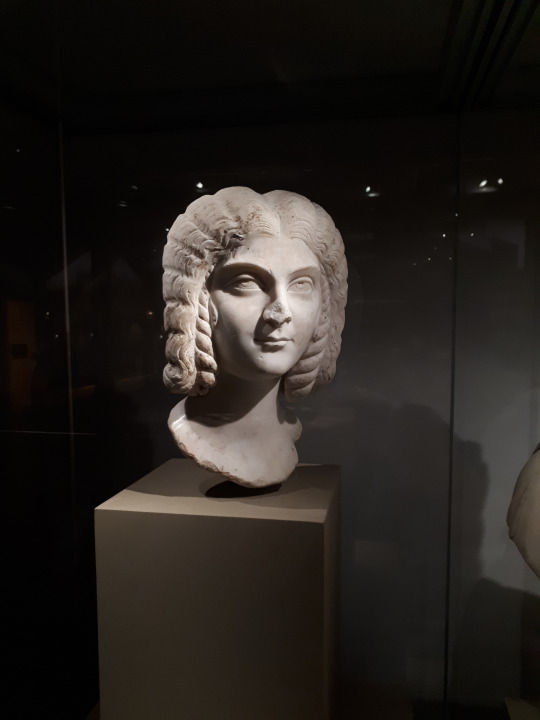

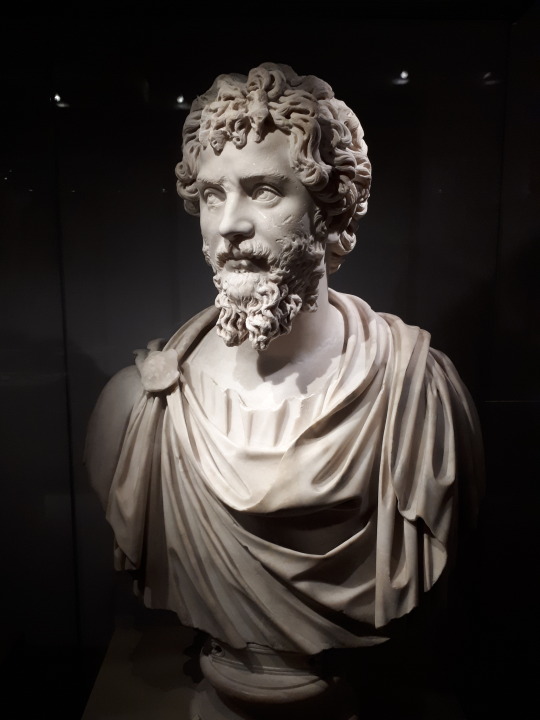
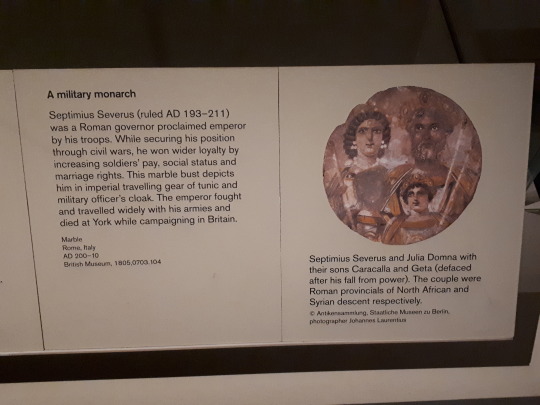
14 notes
·
View notes
Text

How Hadrian’s Wall is Revealing a Hidden Side of Roman History
A party invitation. A broken flipflop. A wig. Letters of complaint about road conditions, and an urgent request for more beer.
It sounds like the aftermath of a successful spring break, but these items are nearly 2,000 years old.
They’re just some of the finds from Hadrian’s Wall – the 73-mile stone wall built as the northwestern boundary of the Roman Empire, sealing off Britannia (modern-day England and Wales) from Caledonia (essentially today’s Scotland).
While most of us think of Pompeii and Herculaneum if we’re thinking of everyday objects preserved from ancient Rome, this outpost in the wild north of the empire is home to some of the most extraordinary finds.
“It’s a very dramatic stamp on the countryside – there’s nothing more redolent of saying you’re entering the Roman empire than seeing that structure,” says Richard Abdy, lead curator of the British Museum’s current exhibition, Legion, which spotlights the everyday life of Roman soldiers, showcasing many finds from Hadrian’s Wall in the process. A tenth of the Roman army was based in Britain, and that makes the wall a great source of military material, he says.
But it’s not all about the soldiers, as excavations are showing.
A multicultural melting pot
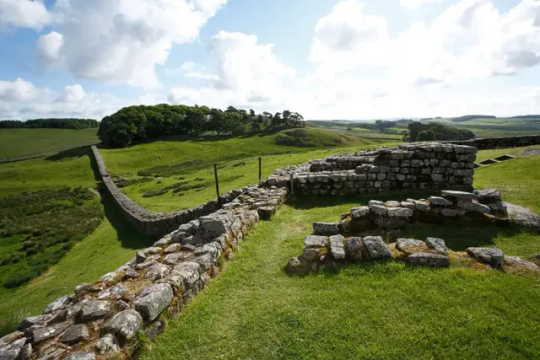
Hadrian, who ordered the wall to be built in 122CE after a visit to Britannia, had a different vision of empire than his predecessors, says Frances McIntosh, curator for English Heritage’s 34 sites along Hadrian’s Wall.
“All the emperors before him were about expanding the empire, but Hadrian was known as the consolidator,” she says. He relinquished some of the territory acquired by his predecessor Trajan, and “decided to set the borders” – literally, in some cases, with wooden poles at sites in Germany, or with stone in Britannia. Where those poles rotted thousands of years ago, the wall is still standing: “A great visual reminder” of the Roman empire, says McIntosh.
It’s not just a wall. There’s a castle every mile along, and turrets at every third-of-a-mile point, with ditches and banks both north and south. “You can imagine the kind of impact that would have had, not just on the landscape but on the people living in the area,” says McIntosh.
And thanks to the finds from the wall, we know a surprising amount about those people.
Although historians have long thought of army outposts as remote, male-dominant places, the excavations along the wall show that’s not the case. Not only were soldiers accompanied by their families, but civilians would settle around the settlements to do business. “ You can almost see Housesteads as a garrison town,” says McIntosh. “There were places you could go for a drink and so on.”
The Roman rule of thumb was not to post soldiers in the place they came from, because of the risk of rebellion. That meant Hadrian’s Wall was a cultural melting point, with cohorts from modern-day Netherlands, Spain, Romania, Algeria, Iraq, Syria – and more. “It was possibly more multicultural because it was a focus point,” says McIntosh, who says that the surrounding community might have included traders from across the empire.
Soldiers were split into two groups. Legionaries were Roman citizens from Italy, who had more rights than other soldiers and imported olive oil, wine and garum (a sauce made from decomposing fish).
They worked alongside auxiliaries – soldiers from conquered provinces, who had fewer rights, but could usually acquire citizenship after 25 years of service.
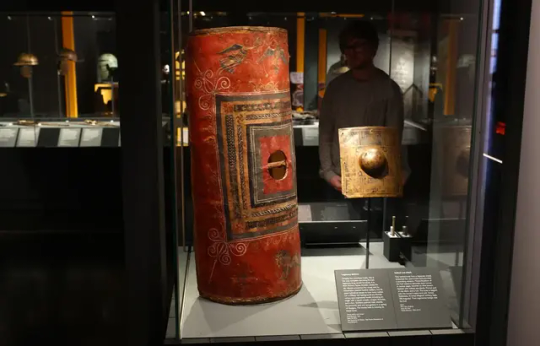
Soldiers carved their names and regiments on stones to show which part of the wall they built – around 50 of them are on display at Chesters fort.
But the wall shows that women and children were equally present.
McIntosh says that pottery brought to the camps – from the Low Countries and North Africa – shows that the soldiers “brought their families, who cooked in traditional style.” Archaeologists have found what seems to be an ancient tagine for North African-style cooking.
A tombstone from Arbeia fort for a woman named Regina shows she was a freed slave from southern Britain who was bought by – and married to – a Syrian soldier.
Another woman buried at Birdoswald fort was laid to rest with chainmail that appears to be from modern-day Poland. “Perhaps she married someone in the army,” says McIntosh, who calls the wall a “melting pot of people from all over the world under the banner of the army.”
“They brought their own religions, as well as worshipping Roman gods and adopting local deities,” she adds. At Carrawburgh, a temple to Mithras – an originally Persian deity – sat near a spring with a shrine to a local water spirit.
‘Wretched little Brits’
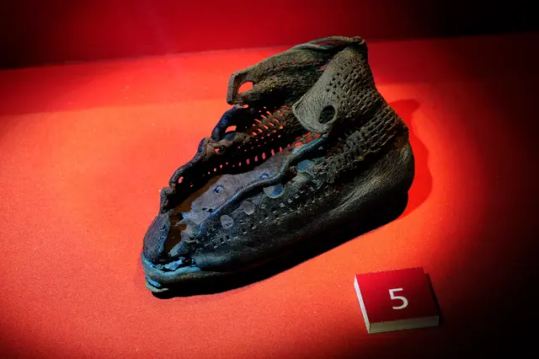
Some of the most extraordinary finds from the Roman empire are coming from one site on Hadrian’s Wall: Vindolanda. Here, archaeologists have found a wealth of organic remains because of what curator Barbara Birley calls the “unusual conditions onsite.”
At Vindolanda there are the remains of at least nine forts over 14 levels. “When the Romans would leave, they would knock down timber forts, and cover the area with turf and clay, sealing the layers underneath,” she says.
“Because it happened so many times, the bottom five or six layers are sealed in anaerobic conditions, so things don’t decay. When we get down there, we get wooden objects, textiles, anything organic.”
Vindolanda has the largest collection of Roman textiles from a single site in western Europe, as well as the largest leather collection of any site in the Roman empire – including 5,000 shoes, and even a broken leather flip-flop. “We probably had a population of 3,000 to 6,000 depending on the period, so 5,000 is a lot,” says Birley. For Abdy, the shoes evoke the conditions of the wet borderlands. “Women’s and children’s shoes are hobnailed – you needed it in the mucky frontier dirt tracks. They’re very evocative.”
There’s even a wig made from a local plant, hair moss, which is said to repel midges – the scourge of Scotland during the summer. A centurion’s helmet is also crested with hairmoss – the ancient equivalent of spraying yourself with insect repellent.
The first woman to write in Latin
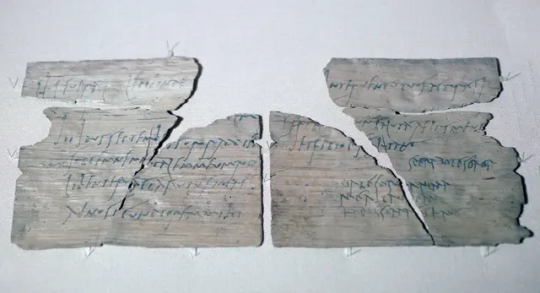
One of the most famous finds is the trove of wooden writing tablets – the largest found anywhere.
“They give a snapshot of what life was actually like,” says Birley. “We understand so much more from written correspondence than from ‘stuff,’ and, archaeologically, it’s the stuff that usually survives – things like metals and ceramics.
“These were written in ink, not on a wax stylus tablet, and we believe they were used for what we’d put in emails: ‘The roads are awful,’ ‘The soldiers need more beer.’ Everyday business.”
The tablets – or “personal letters” as Birley describes them – were found on the site of a bonfire when the ninth cohort of Batavians (in the modern-day Netherlands) were told to move on.
“They had a huge bonfire and lots of letters were chucked in the fire. Some have been singed – we think it may have rained,” she says. One of them calls the locals “Britunculi” – “wretched little Brits.” Another talks about an outbreak of pinkeye. One claims that the roads are too bad to send wagons; another laments that the soldiers have run out of beer.

Among the 1,700 letters are 20 that mention a woman called Sulpicia Lepidina. She was the wife of the commander of the garrison, and seems to have played a crucial role. There’s a letter to her from another woman, Paterna, agreeing to send her two medicines, one a fever cure.
Birley says it’s similar to today. “If you’re a group of moms, still today we say, ‘Do you have the Calpol?’ It’s very human.” For Abdy, it’s a sign that women were traders. “She’s clearly flogging her medicines,” he says. “It’s really great stuff.”
Another tablet is an invite from Claudia Severa, the wife of another commander at a nearby camp. It’s an invitation to a birthday party. Under the formal invitation, presumably written by a scribe, is a scrawl in another hand: “I shall expect you, sister. Farewell, sister, my dearest soul.”
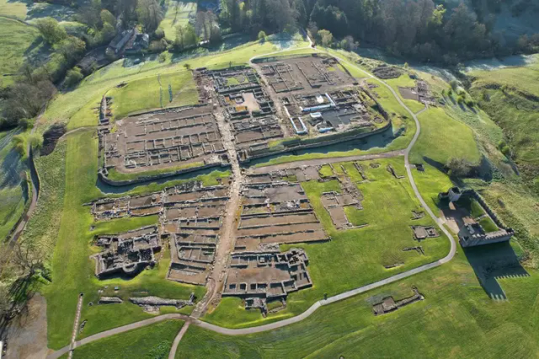
Presumably written by Claudia herself, it is thought to be the earliest example of a woman’s handwriting in Latin.
Without the organic finds – the shoes and the letters that indisputably belonged to women, unlike jewellery or weaving equipment – it’s difficult to prove conclusively that women lived in significant numbers. Vindolanda “illustrate the missing gaps,” says Abdy. For Birley, they prove that women were as crucial a part of army communities as men. “Before the Lepidina tablets were found we didn’t really understand the interactions between the soldiers and their wives,” she says. Another tablet is written by what is thought to be a Spanish standard-bearer’s common-law wife, ordering military equipment for her partner.
“The Vindolanda collection is showing that there weren’t just camp followers and prostitutes; women were part of everyday life, and contributing to the military community in many ways,” says Birley.
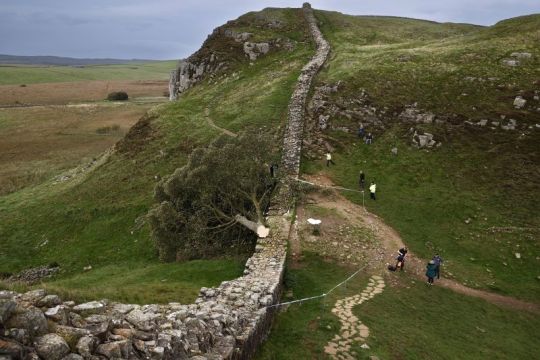
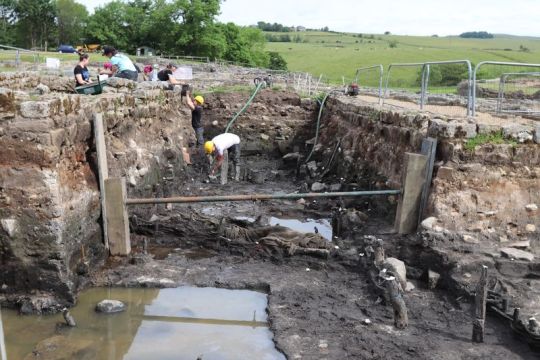
Abdy says that Hadrian’s Wall is interesting because the resident women span “all classes of society,” from Regina – the dead freedwoman, who would have been “bottom of the heap” – to the trader Paterna and the noblewoman Lepidina.
And of course, there’s the wall itself.
“In the Netherlands and Germany the finds are often stunning and better preserved – you go to museums and are bowled over. But in terms of structural remains, Hadrian’s Wall must be among the best,” says McIntosh, modestly, of her site.
Abdy agrees: “I can’t think of many symbols so redolent of imperial will than that wall.”
By Julia Buckley.

#How Hadrian’s Wall is Revealing a Hidden Side of Roman History#Hadrian’s Wall#emperor hadrian#northwestern boundary of the Roman Empire#Britannia#Caledonia#roman legions#ancient artifacts#archeology#archeolgst#history#history news#ancient history#ancient culture#ancient civilizations#roman history#roman empire#long post#long reads
918 notes
·
View notes
Text
25th February 2024 British Museum: Legion: life in the Roman army Part 7
Getting towards the end...
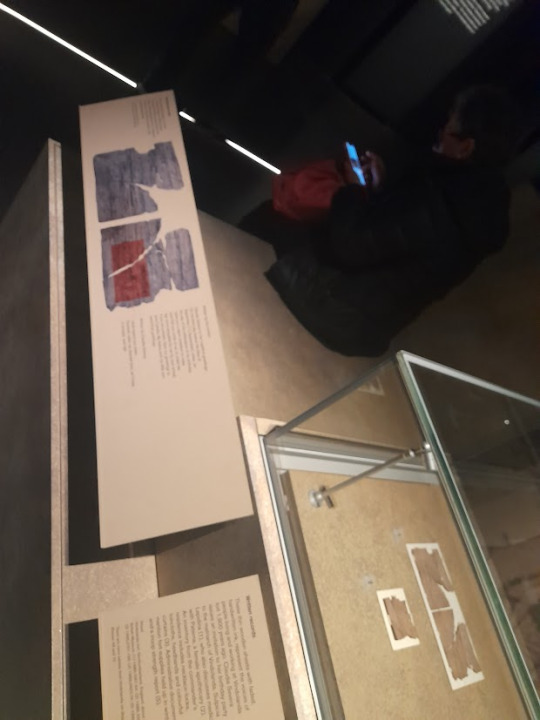
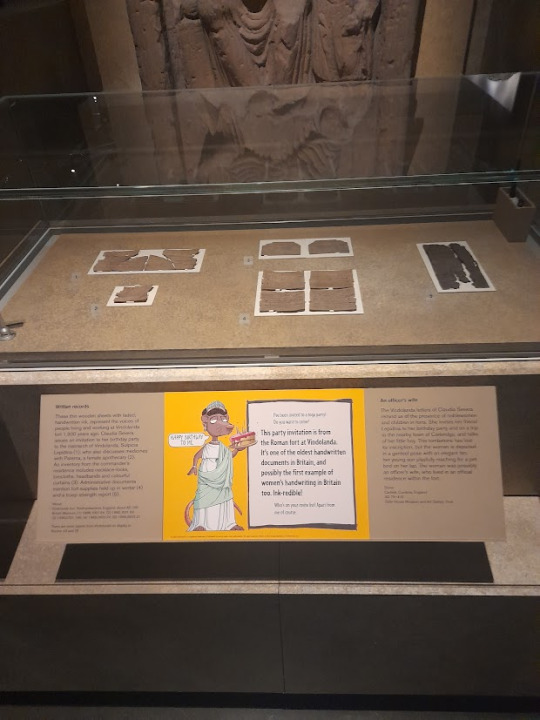
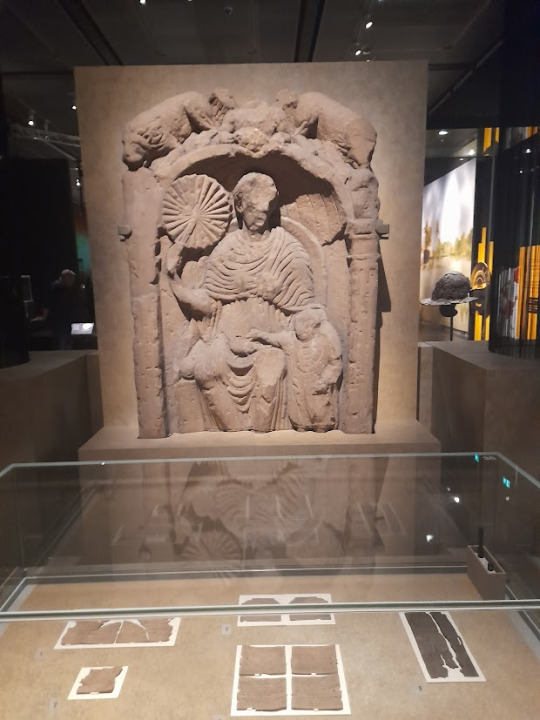
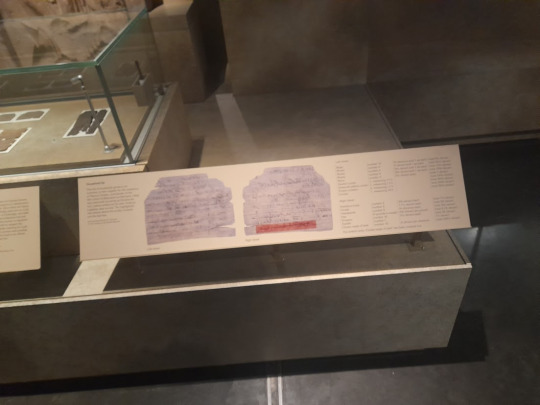
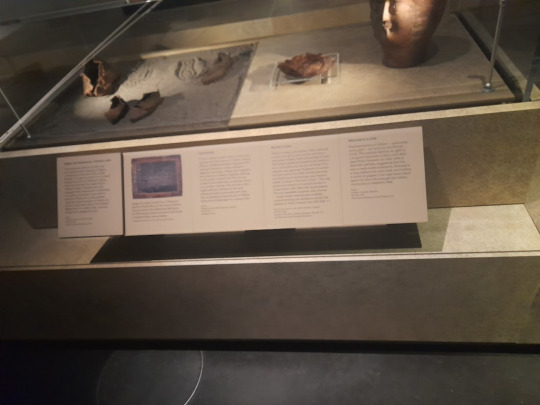
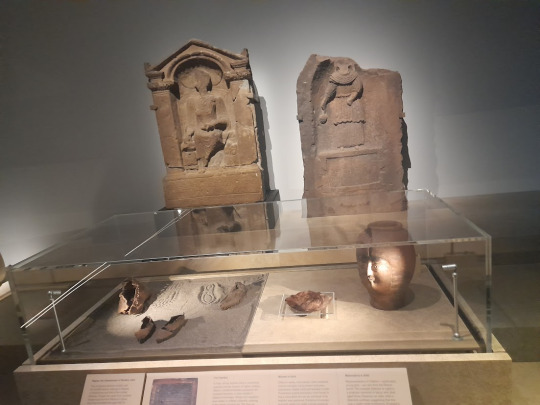
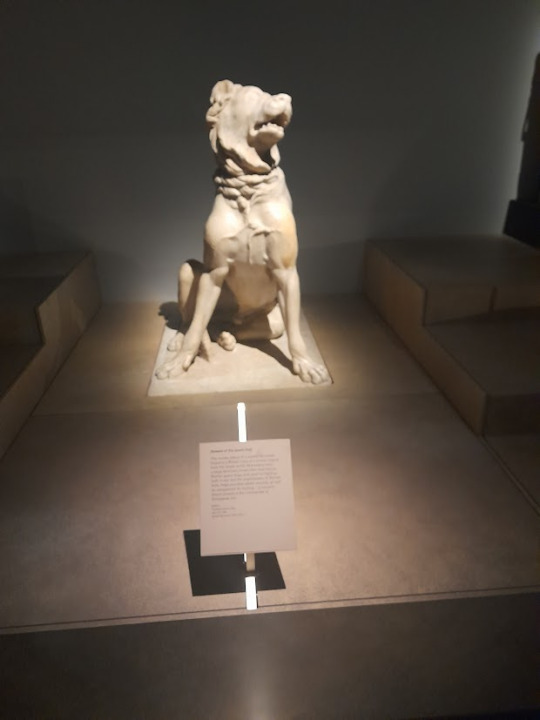
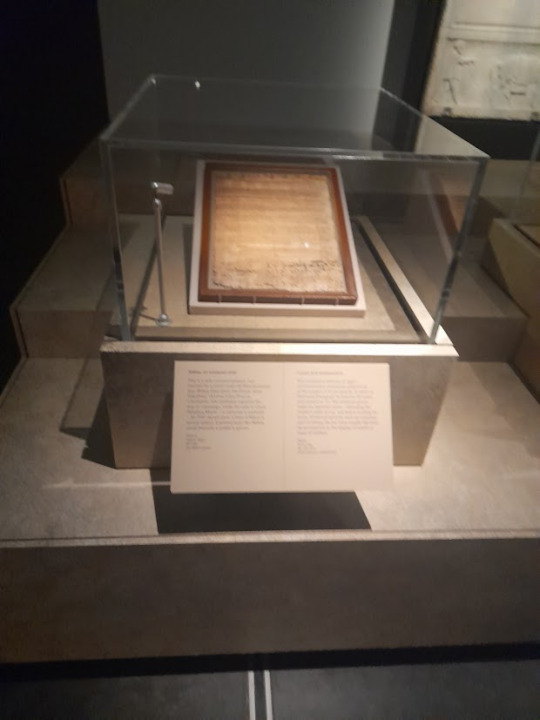


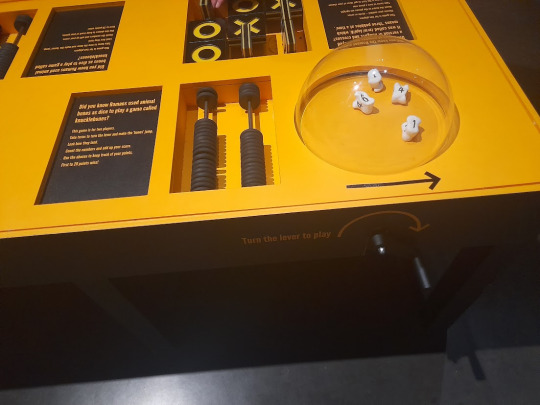
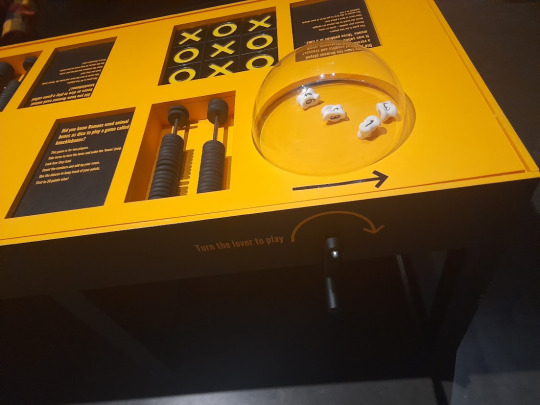
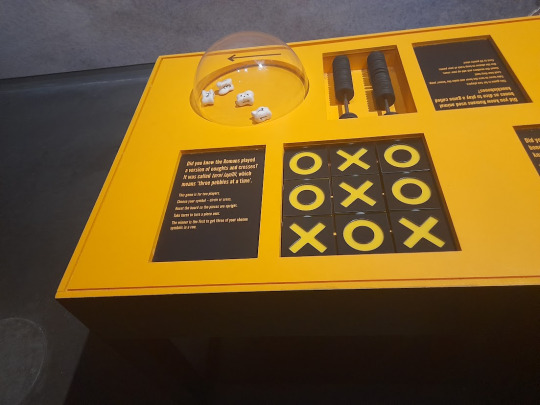
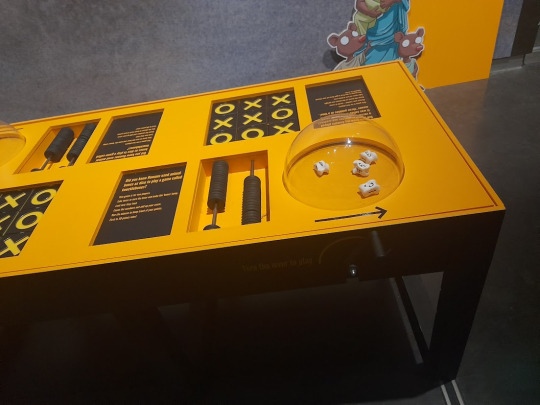
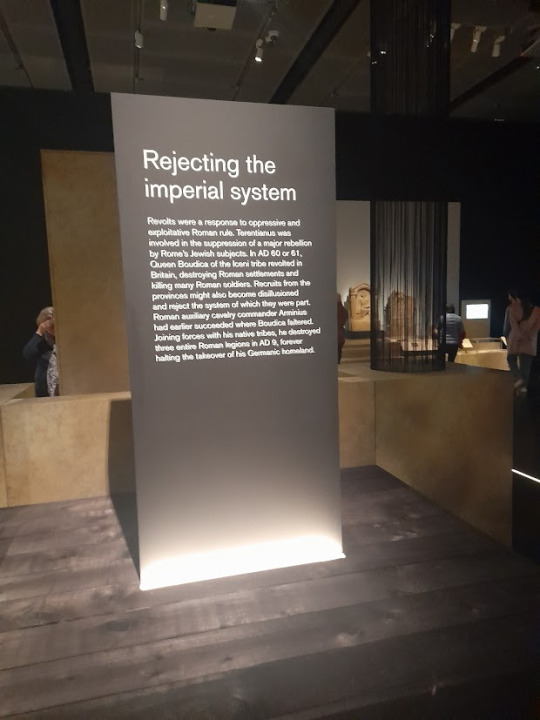
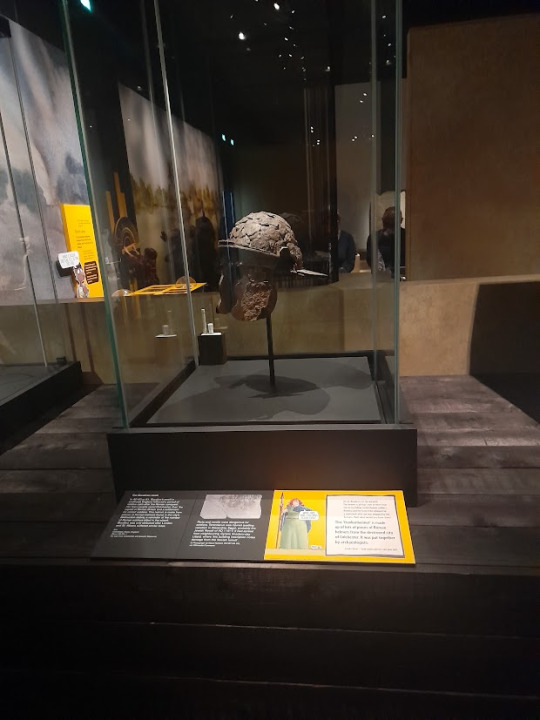
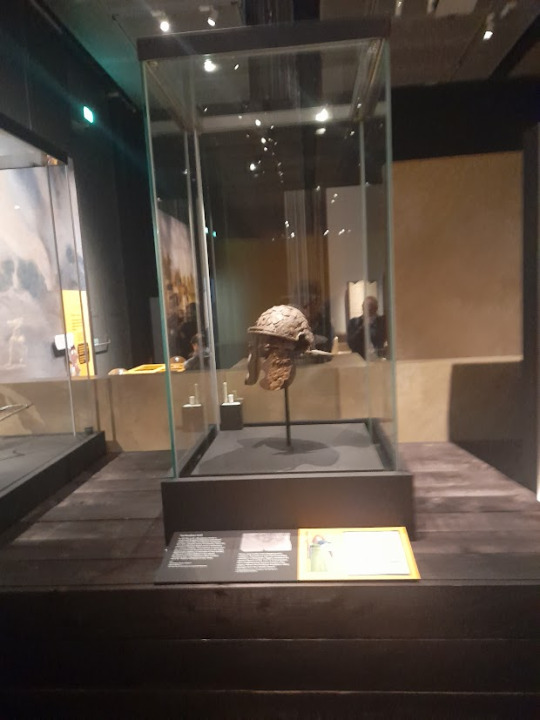
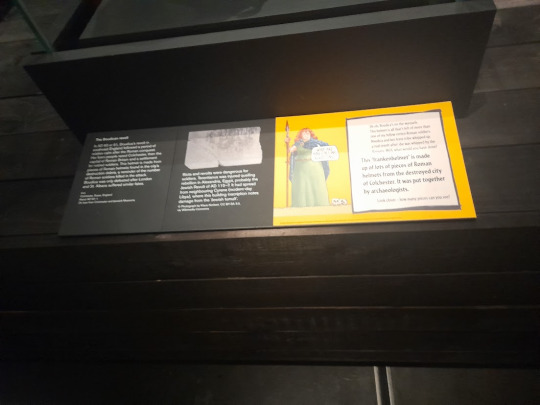
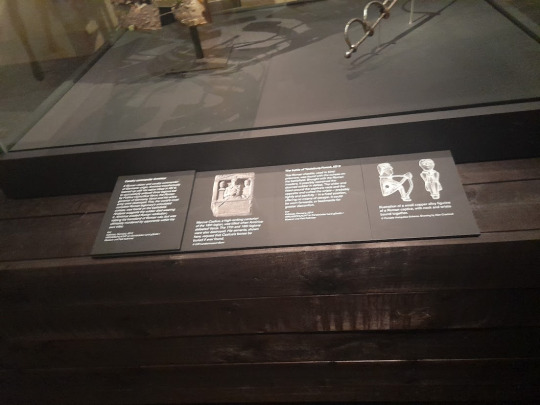
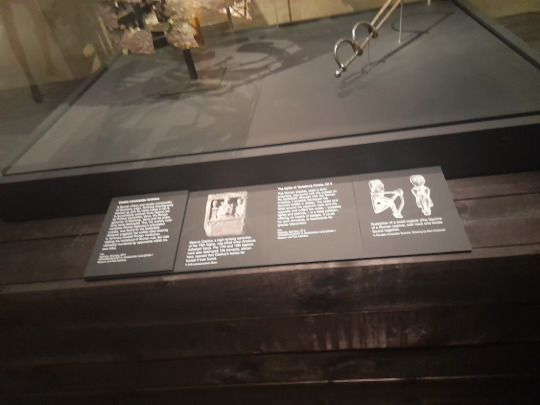
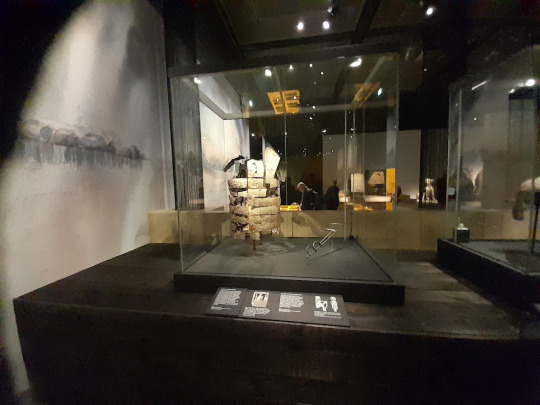
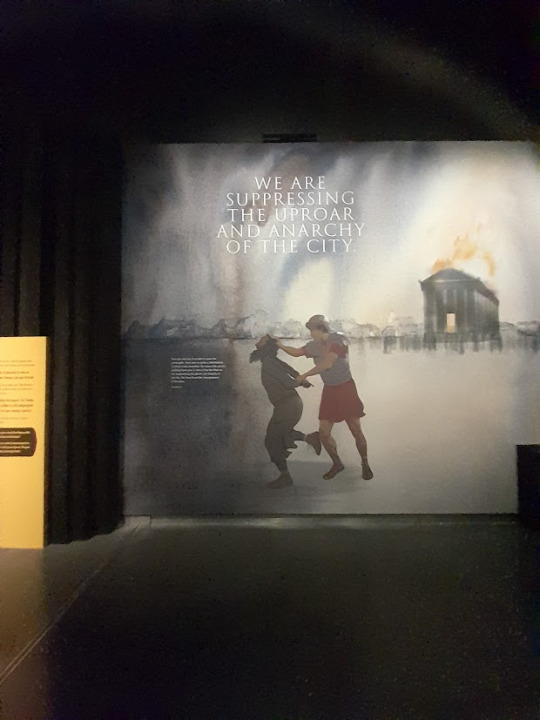
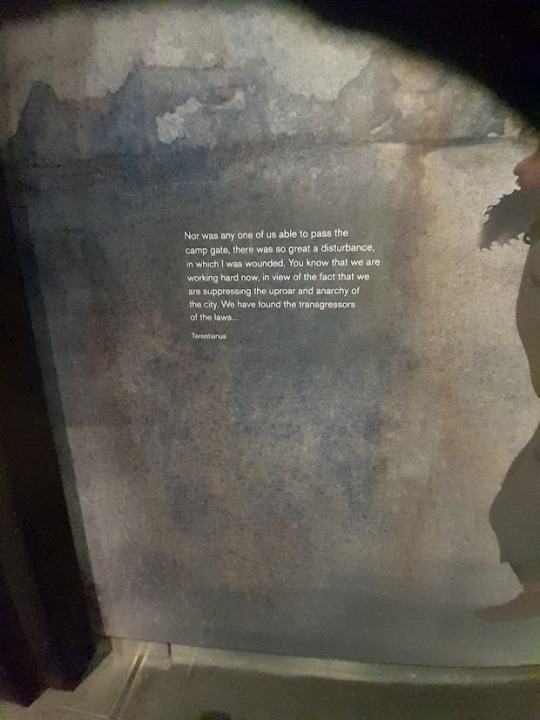
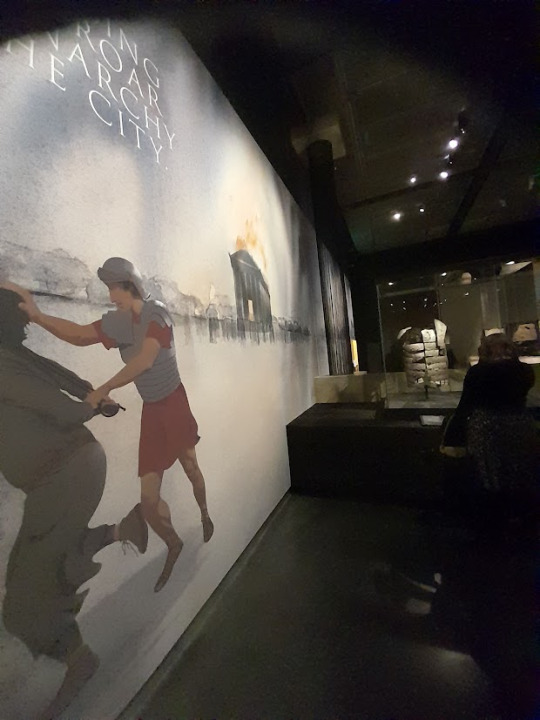
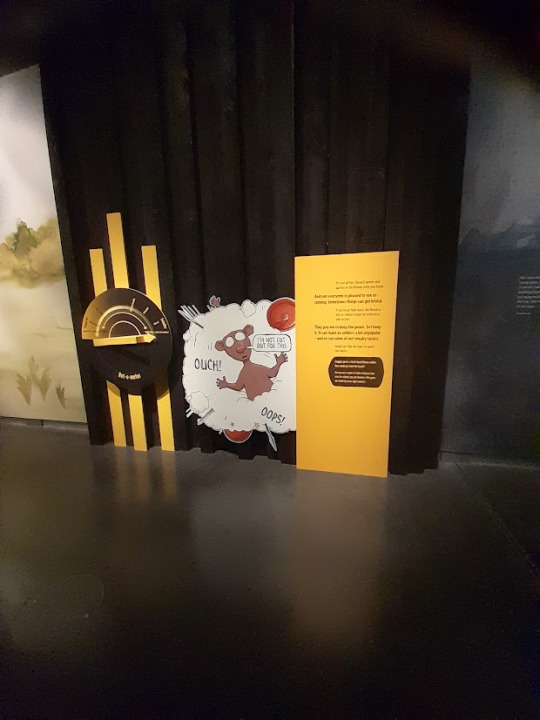
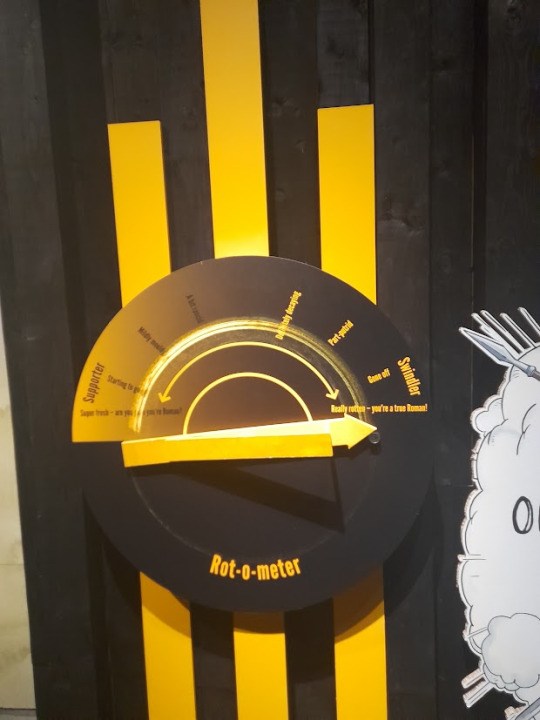
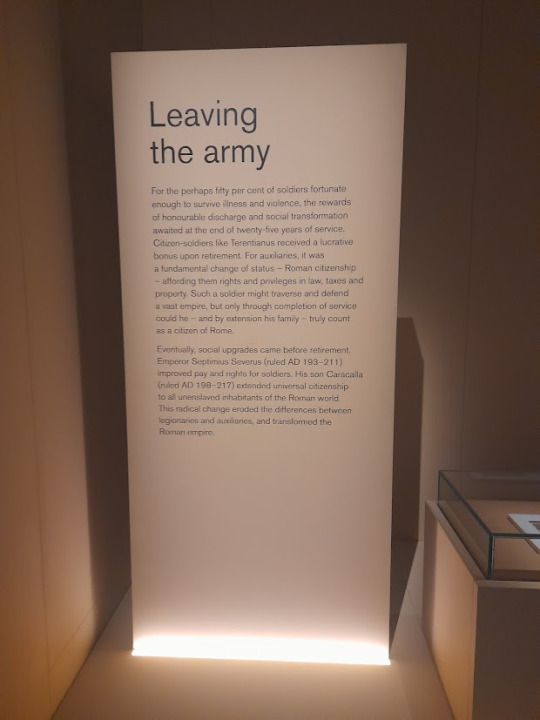
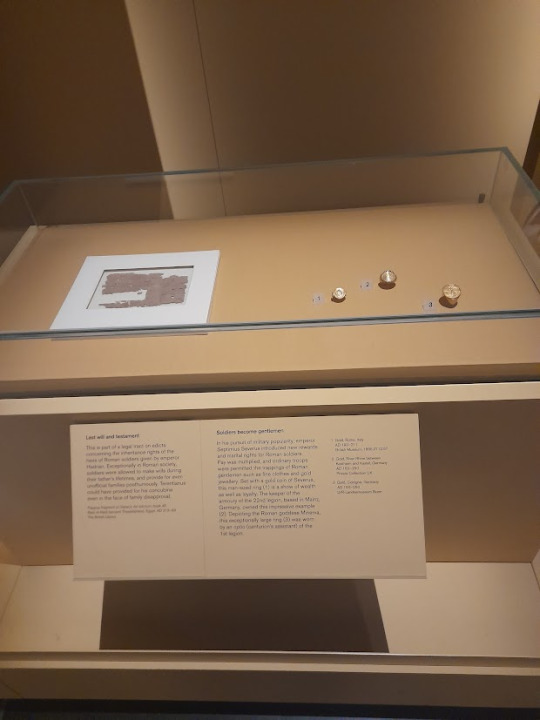
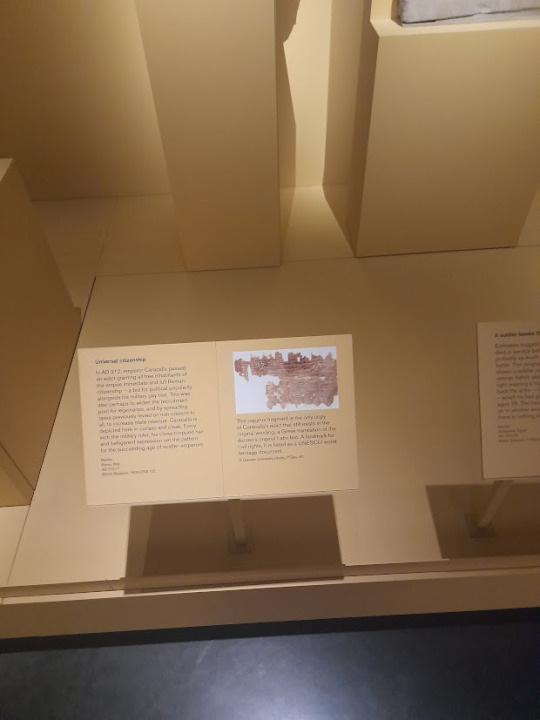
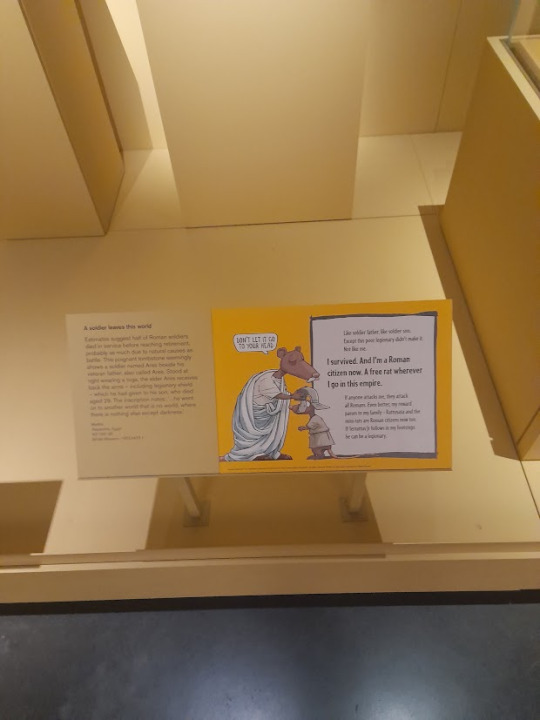
Retiring from the army...
0 notes
Text
Titus Flavius and his indelible traces.
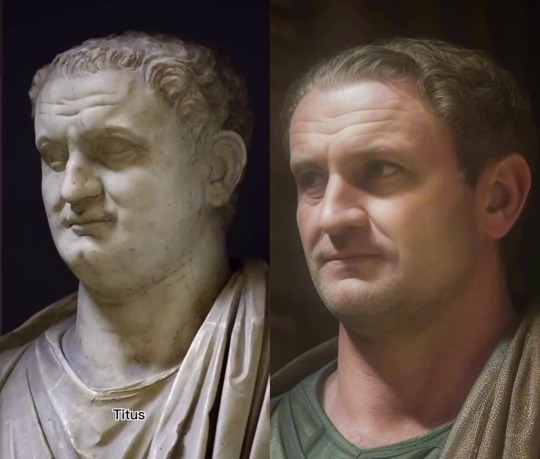
Titus Flavius was born in Rome on December 30 of the year 39. He was a direct descendant of a loyal soldier of Pompey the Great during the Civil War against Julius Caesar. After Pompey's defeat at the Battle of Pharsalia, his life was spared by Julius Caesar, returned to home and became a Publicanus (tax collector). In an incredible twist of fate, the Flavians, a family of peasants, who came from the defeat of the past, ended up occupying the throne founded by Caesar's heir.
During reign of 'Caligula' (37-41) Vespasian, father of Titus, was Aedile of Rome. According Suetonius, Emperor passed by a street that was very dirty, ordered Vespasian to be brought and the garbage thrown on him, and then told him "Do your job well, keep the city clean."
During the reign of Claudius (41-54) Vespasian obtained the position of praetor and the command of one of the legions that went to the conquest of Britannia. In 51 was Consul.
After rebellion in Judea in the year 66, emperor Nero chose the experienced general Vespasian to put an end to the conflict. Vespasian went with his son, Titus, who was then 26 years old, and was an excellent army's officer.
In June 68, after of the death of Nero, the first civil war of the imperial era broke out, which would last until December of the following year. In the chaotic year 69, known as The Year of the 4 emperors: the first ,Galba was assassinated; the second, Otho committed suicide; the third, Vitellius, was executed, the fourth, Vespasian was proclaimed emperor by the army, ending the civil war. Titus was left in command against the rebellion in Judea.
The war in Judea was halted for a year- while Vespasian waged civil war against Vitellius- and resumed in early 70, when Vespasian had secured his position as emperor.
During his father's reign, Titus served as consul seven times and also assumed the command of the praetorian guard.
A historical event of mystical relevance.
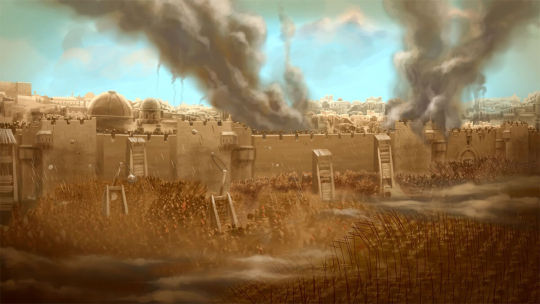
After months of bloody fighting, on August of the year 70, the Temple of Jerusalem was looted, burned and demolished by Titus's troops.
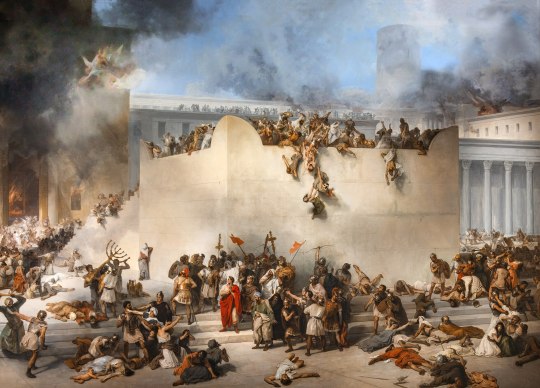
'The destruction of the Temple of Jerusalem', By Francesco Hayez 1867
Titus along his father and brother had a triumphal parade in Rome. Years later, in the place where they passed, his younger brother, the Emperor Domitian, ordered the construction of the Triumphal Arch. One of its extraordinary relief depicts the Triumph with the treasures of the Temple. It should be noted that Vespasian and his two sons had the name TITUS FLAVIUS, so emperor Domitian (Titus Flavius Domitian) built the famous Arch of Titus not necessarily in honour of his brother - as is popularly believed - but rather in honour of the Triumph of the Flavians.
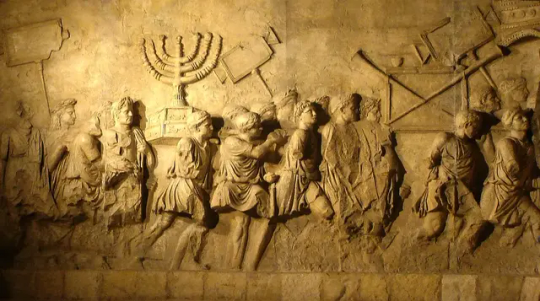
Some modern historians agree that such a Triumph was not due to what happened in Jerusalem, since the First Jewish–Roman War did not really end completely in August 70, but in April 73 at Masada. The real reason was the accession to the throne of Vespasian, and the presentation of Titus as heir. As Dio Cassius recounts, with Vespasian declared emperor, Titus and his brother Domitian received the title of Caesar in the name of the Senate.
But Vespasian become emperor by defeating other Romans in a civil war. Triumphal parades could not be held by defeating other Romans, so the rebellion in Judea was just a perfect excuse for the celebration.
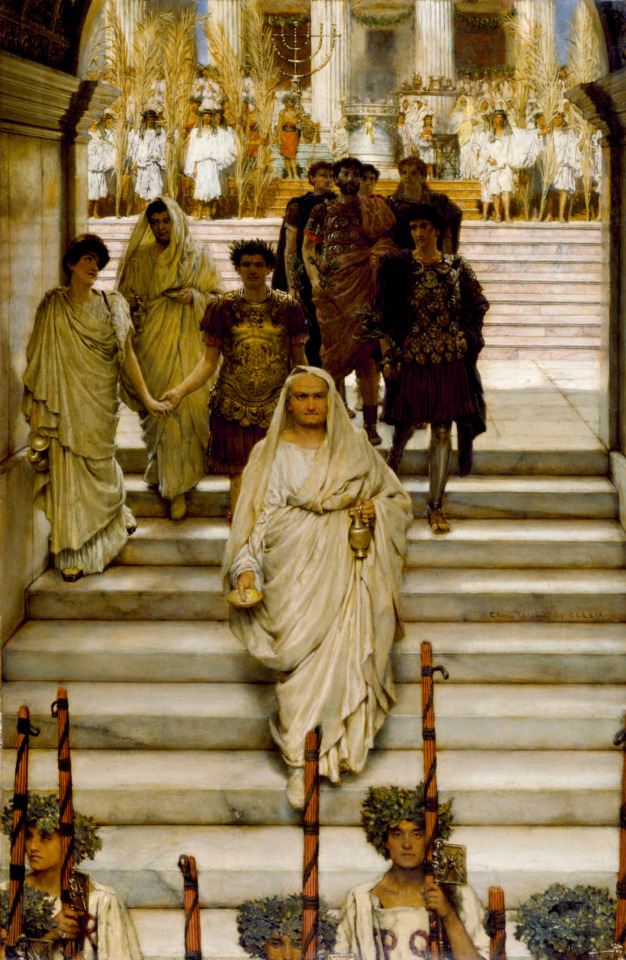
'The Triumph of Titus: The Flavians' By Sir Lawrence Alma-Tadema (1885)
The central figure in white (pontifex maximus) is not Titus but his father Vespasian. Behind him we see his youngest son Domitian, holding the hand of his wife Domitia Longina, and behind them is Titus, dressed as his father. She looks romantically at Titus, and he returns a knowing look. Lawrence Alma-Tadema thus portrayed the historical rumour that Emperor Titus Flavius was having an affair with his sister-in-law.
Vespasian decided to tear down the Domus Aurea, the palace that Nero had ordered to be built for his own enjoyment, and build "a palace for the enjoyment of the people". He saw his work almost completed but died of illness on June 23, 79, at his estate. The next day Titus Flavius succeeded him.
A mess with the gods.
Four months later a tragic event occurred. The peaceful mount Vesuvius exploded. This catastrophe was a personal tragedy for Titus, as it caused the death of Pliny the Elder, a close friend whom he had met in Germania as a young soldier. Pliny dedicated his great work, Naturalis Historia, to Titus.
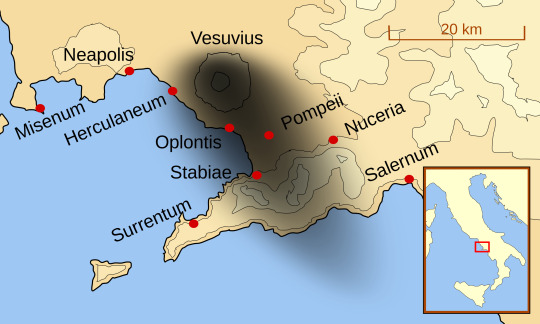
" There were some dreadful disasters during his reign, such as the eruption of Mount Vesuvius in Campania, a fire at Rome which continued three days and as many nights, and a plague the like of which had hardly ever been known before. In these many great calamities he showed not merely the concern of an emperor, but even a father's surpassing love, now offering consolation in edicts, and now lending aid so far as his means allowed. He chose commissioners by lot from among the ex-consuls for the relief of Campania; and the property of those who lost their lives by Vesuvius and had no heirs left alive he applied to the rebuilding of the buried cities ." ― Suetonius (The Lives of the Twelve Caesars ;Titus).
Soon rumors began to circulate that the gods had a personal problem with Titus because of his forbidden love for Princess Berenice, great-great-granddaughter of Herod the Great.
Although he was a very popular emperor, he did not want to risk those tragedies affecting his image, so he decided in the year 80 to accelerate his father's work, which still had to wait to be completed. And so began the inauguration of the most famous amphitheater in history.
Very soon the people of Rome forgot about Vesuvius, the conflagration, the plague, and Berenice. There were 100 days of games: Recreations of naval battles, with that monumental site full of water, exhibitions of wild animals and the legendary gladiator fights. Those shows were free for the people.
They had never seen an amphitheater of such grandeur.
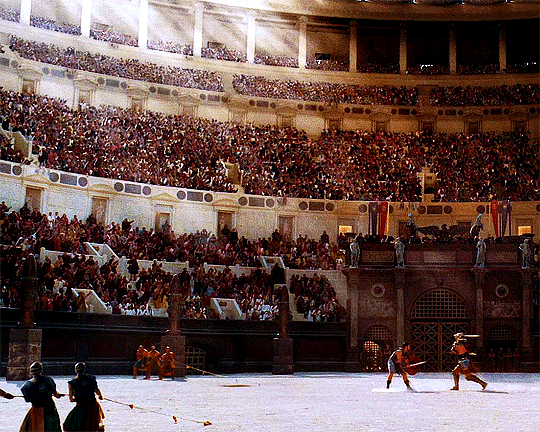
Its height and shape were a real architectural novelty, something completely different from the classic Roman amphitheatres. Because of the sculpture, Nero's Colossus, the only thing that Vespasian did not order to be demolished and that remained imposing next to the amphitheatre, over time people began to say "let's go to the Colossus" (the Colosseum). Ironically, the great work that Vespasian ordered to be built to replace the Domus Aurea, and Titus officially inaugurated, instead of being known as the Amphitheatre Flavius, went down in history with the name of the sculpture that Nero ordered to be built.
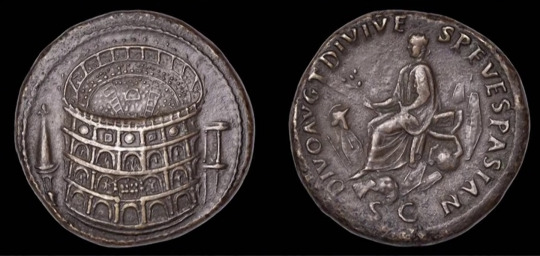
A sesterce from the time of Emperor Titus.
The pseudo-Nero
After Nero's death, rumors began to circulate that his suicide was not real. Years later, this rumor had spread throughout the empire and even beyond its borders. Suetonius wrote about an event that he experienced during the reign of Domitian: "Twenty years after his death, when I was young, a man of obscure origin appeared, who claimed he was Nero; And the name Nero was still in such favour with the Parthians that they supported him vigorously and surrendered him with great reluctance."
The Parthians were happy believing that Nero was alive because during his reign he signed the peace treaty.
Titus had to face the rebellion of a guy called Terentius Maximus, another Pseudo-Nero that according Dio Cassius "He resembled Nero in voice and appearance and, like him, he played the lyre." The impostor had a lot of followers in the eastern Roman provinces. The Parthian king received this man and made preparations for him to return to Rome as legitime emperor but he was executed when his true identity was revealed.
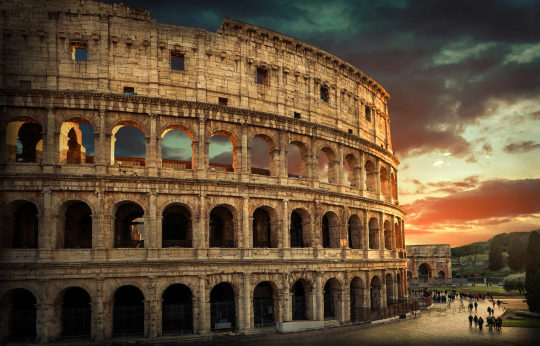
On September 13, 81, Titus died at the age of 41 on his father's farm, due to fever. His brief reign was very prosperous and free of military and political conflicts. He was the first Roman emperor to succeed his father.
Having only a daughter (Julia Flavia), his successor was his brother Domitian who ruled for 15 years.
According to Roman writers, his last words were: "I regret nothing except one thing"; And some believe that he regretted not marrying Berenice.
The Colosseum and the Wailing Wall are undoubtedly the two indelible traces of Titus Flavius.
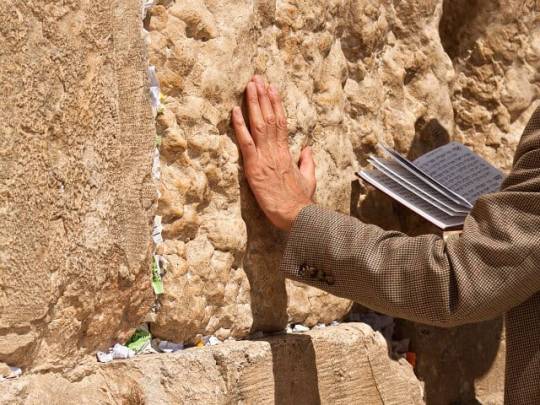
231 notes
·
View notes
Text
So, I mentioned here that I had many more thoughts on the Tevinter Imperium’s military and its pay, which ties a lot into my thoughts on the Soporati class. And someone was brave enough to encourage me to keep going. (And my beta is going Through it right now, so I really ought to stop dumping more one-shots in her inbox like a child collecting cool rocks.)
Oooh, my friends, I am unleashed. 🤣
So, first things first, Tevinter, in the world of DA, is very clearly patterned on the Roman Empire. It’s not one for one, of course, “inspired by” and “the same as” are two very different things. Nonetheless, there is a lot of real world Roman Empire influence in the game’s conceptions of game world Tevinter. So many of my thoughts, here, are influenced by the realities of life for soldiers in the armies of the Roman Empire (and the Republic, as DA takes from that time period too, just less so).
We learn throughout the games that Tevinter is structured into roughly five classes (but arguably six, there’s some questions there that the other post digs into). Three citizen classes: Altus, Laetan, and Soporati. Two non-citizen classes: Liberati and slaves. The Altus and the Laetans are mage citizen classes, the Soporati the non-mage citizens of the Imperium and by far the most numerous citizen class. The Liberati (freed slaves) and slaves aren’t (full) citizens of the Imperium, even though they’re ruled by it.
By virtue of being part of the Altus and Laetan classes, mage citizens have educational and professional opportunities that many Soporati lack. Indeed, based on what we can glean in-world, the Soporati largely are a poor class other than a fortunate few who manage to scrape up and/or inherit money through one of two ways. One, the merchant class. Most Soporati merchants are also not well-off in Tevinter. But a limited few are.
And then there’s the Imperial legions.
The way the Imperial legions are talked about in the games, they seem to be one of the few options for achieving financial stability and security for Soporati in Tevinter. Note: This is not the case for the Liberati or the slaves, as they are not citizens and thus not allowed to join the Legion.*
And broadly that may be true. If we take as a given - and this is admittedly a big ask - pay and military structure work similarly in the Tevinter legions as it did in the Roman ones, a standard, enlisted legionnaire would receive: (1) room, (2) board, (3) salary, and (4) retirement (and potentially also bonuses). The salary for the average legionnaire is likely very small. Less than most jobs likely pay. An average legionnaire probably has a lower salary than Tarquin or Rana Savas. HOWEVER, since the Legion is providing housing and food during service, legionnaires have guaranteed disposable income in a way that most Soporati don’t appear to. Higher ranking members of the legions, officers, would receive 2x-10x the salary, depending on the specific rank. At the end of it all, they’d receive a retirement (in Rome this was property and/or 10+ years salary).
In exchange for those financial benefits (again, taking similarity to the Roman legions as a given, which is a big assumption), legionnaires: serve a fixed term (it was around 20 years during the Roman Empire, but that isn’t my headcanon for Tevinter); cannot marry during their term; cannot own property during their term; are subject to brutal discipline; and have a very high death rate during their term. Like 50% or more high. Even for officers. These restrictions mean that their wealth can’t be passed on as easily (remember, no marriage), isn’t as stable (no property), and isn’t guaranteed (no retirement if you die or are dishonorably discharged, and pay can be suspended as discipline). They may not be able to inherit, depending on if one headcanons Roman inheretence laws as also being mimicked in-game by Tevinter.
Add to that that many Soporati members of the legions are likely not used to managing much money (making them, however accidentally, more prone to mismanaging it) and are sending money home to parents/siblings/loved ones. On average, most legionnaires likely have very little actual wealth. They just have free housing and food. They’ve essentially given themselves, at great personal risk, to the Imperium to fight on behalf of a country they have very little say in the governance of because it’s a better shot than being potentially homeless or forced to sell themselves into slavery.
This is quite possibly - though again, I’m relying on at least one major assumption here - the existence that is sold as one of the only paths to stability and security for the Soporati class. Which I feel like says a lot about how little the rest have.
* Tevinter may have forces akin to the Roman auxiliaries (how non-citizens could serve in a military capacity in the Roman Empire) that include the Liberati or slaves (and we know from in-universe sources they do get used as mercenaries, bodyguards, or spies), but that’s never made clear.
23 notes
·
View notes
Text
The Strange Inaccuracies of HBO's Rome
HBO's Rome had a very ambitious plot, portraying the final years of the Roman Republic from the start of Caesar's war against Pompey and running until Augustus' ascension as first emperor. It ended after 2 seasons, so it was inevitable that story would be a bit compressed. Characters are cut and combined. Entire wars are cut. Understandable. They only had so much screentime.
This post isn't about the areas they had to compress. This post is about the strange things they decided to add.
First of all, just to get it out of the way, throughout the entire show the characters insist on referring to Gaius Octavius as "Octavian." This despite the fact that "Octavian" isn't even a real name and people only started calling him that after he died. Either this was a research failure, or HBO was pandering to the demographic of people who know who Octavian is but don't know that wasn't actually his name.
Moving on.
In HBO's Rome, when Caesar unexpectedly marches south with a legion and threatens Rome, Pompey Magnus packs up the gold in the treasury to take it with him. The gold is lost in a fight, found again, buried, dug up, and eventually handed over to Julius Caesar in an improbable and time-consuming sequence of events.
In real life, it's not clear exactly why Pompey chose to leave most of the treasury behind. Whatever the reason, he took only some money from the treasury (with the legal permission of the Senate) and left the rest. When Caesar arrived in the city, one of the first things he did was take everything that was left under the flimsiest of pretenses. When officials tried to stop him he threatened to have them killed.
The effect of HBO's version is to remove Caesar's agency. He ended up with the gold without having to actually steal it from the treasury. Pompey looted the treasury, and then Caesar won it fair and square. It's weird that they created this entire plot point in order to shy away from portraying Caesar's tyranny.
This reassignment of agency happens more than once in HBO's Rome. To give another example, let's look at the truce that is negotiated after Caesar's assassination.
In HBO's Rome, Brutus decides that the conspiracy should only kill Caesar, no one else. They do that, and then they return to their mansions and take no further action. Meanwhile, in Mark Antony's house, Caesar's will is read. It is revealed that Caesar left his entire fortune to Octavian. Octavian (of all people) suggests a truce between the Assassins and the Caesarians, in which all of Caesar's acts and appointments (and his will) will be ratified, but the assassins won't be punished for his death.
In real life, Gaius Octavius wasn't there. He wasn't even in Rome. It was Brutus who initiated the negotiations, and the truce itself was Mark Antony's idea. Except, wait, a truce between who and whom? Why do they even need a truce? Because...
Actually, HBO's Rome omits a pretty important factor here, which is that both sides had armies inside the city when this truce was agreed to. I don't know why they didn't mention that.
After Caesar was assassinated, Brutus and his allies fortified themselves on the Capitoline Hill with a small army of gladiators (read: mercenaries). In response, Lepidus, who is not present in the show at this point, marched an entire goddamn legion into Rome and occupied the city.
Lepidus wanted to kill Brutus. Mark Antony (of all people) had to talk him down. That's the context in which Brutus and Antony negotiated their truce. Even considering the need to cut Lepidus for time, they could have just given the legion to Antony.
Giving credit for the truce to Octavius is just such an odd choice. He was in Illyricum. The truce was agreed to before Octavius even found out that Caesar was dead.
And speaking of Octavius...
In HBO's Rome, many people around Octavian are portrayed as not taking him seriously. Mark Antony, his sister Octavia, and his mother Atia, are all shown essentially rolling their eyes at Octavian's pretensions at grandeur.
Incidentally, we can now properly call him Octavian because at this point he has changed his name to Gaius Julius Caesar Octavianus. We call him Octavian because it's the past-tense of Octavius. He is now the psychotic warlord formerly known as Octavius, known to historians as Octavianus or Octavian, but his friends all call him Gaius Julius Caesar.
HBO's Octavian is a soft little boy who nobody takes seriously. After the will is read, he whines at Mark Antony to pretty please release his inheritance, which Antony brushes off. This culminates in Octavian secretly (?) borrowing a vast sum of money to partially pay out the money (approximately 3 months' pay for a laborer) that Caesar promised in his will to every adult male Roman citizen. After this Mark Antony beats Octavian up, and then Octavian promptly flees the city. Simultaneously, Cicero also flees the city and starts criticizing Antony and praising Octavian. I do not believe the narrative ever specifies that Mark Antony releases Octavian's inheritance to him.
This is, uh, an interesting portrayal of Octavian, to put it mildly. It's interesting how first Julius Caesar and now Octavian are portrayed as softer and more sympathetic than they really were.
First of all, the notion that there was anyone in Rome who didn't take Octavian seriously is a joke. From the second the will was read Octavian was a political force unto himself. In the show Octavian doesn't even start calling himself Caesar until quite far along, and few other people ever humor him. In real life, when he returned to Rome, Caesar's legions flocked to greet Octavian and hail him as Caesar.
When people say that the most valuable thing Caesar gave Octavian was his name, they are not exaggerating for effect. For the rest of the civil war, a recurring theme will be Caesar's legions flat-out refusing to oppose Octavian. Or, as they called him, Caesar.
It is true that Mark Antony refused to hand over Caesar's fortune to Octavian at first, and it is true that Octavian borrowed heavily to fulfill the obligations in Caesar's will. But Octavian didn't flee the city in fear for his safety after that. There was no need. First of all, his donations made him massively popular with the public. If Antony had laid a hand on Octavian at that point, after dragging his feet on Caesar's donations, the mob would have ripped him to shreds. Secondly, one of the things Octavian bought with the money he borrowed was a bodyguard of loyal Caesarian veterans. If Mark Antony had actually tried to personally manhandle him at this point as he does in the show, he would never have made it past Octavian's new heavily-armed posse of veteran legionaries.
Antony eventually had no choice but to release Octavian's inheritance. Now the richest man in Rome, possibly the world, Octavian's personal bodyguard ballooned into a private army.
One day, Mark Antony left the city to inspect some legions. Suddenly, taking everyone by surprise, Octavian's private army put Rome under occupation.
This is the third time Rome has been occupied in, what, two years? First Caesar, then Lepidus, now Octavian.
Mark Antony returned to Rome with his 6 legions, outnumbering Octavian 20 to 1, and this is when Octavian had to flee. But 2 of those 6 legions refused to march against the son of Caesar and immediately went over to Octavian, making the odds much more even. Antony tried to have Octavian declared an enemy of the state, but with Cicero supporting Octavian and opposing Antony that was a difficult prospect.
Antony appealed to Decimus, the governor of Cisalpine Gaul, for assistance. Decimus also immediately went over to Octavian. Decimus was actually one of the people who killed Caesar, so he didn't care about the "son of Caesar," but Antony had very recently started a personal beef with him by trying to steal Decimus's province so there wasn't much of a contest.
It's odd that the show tries to show Octavian as a brilliant schemer with all these things he didn't do, while omitting the things he actually did. Octavian masterfully backed Antony into a corner by forming a unified anti-Antony alliance out of the pro-Caesar and anti-Caesar factions.
And then he stabbed them all in the back!
Antony marched north to confront Decimus. The second he left the city, he lost control of it to Cicero. An army led by newly-elected consuls loyal to Cicero joined up with Octavian and marched against Antony in support of Decimus.
The consular army won over Antony, but both consuls died in the fighting. In the absence of leadership, all the legions under their control ... went over to the son of Caesar. Of course. This was so convenient that a longstanding conspiracy theory holds that Octavian was behind the consuls' deaths.
As an aside, it must have been incredibly frustrating to fight against Octavian. There seems to have been about a 50/50 chance that any army sent against him would defect at first opportunity.
Octavian informed Cicero and the Senate that since both consuls had died, they desperately needed new leadership. Like, right now. Before any new elections could be held. And he had just the person in mind - himself!
Cicero said no, so Octavian marched on Rome. Again. Cicero called on four legions from Africa to defend Rome (remember that Antony just marched off with the legions that were supposed to be defending Rome). All four legions ... went over to the son of Caesar. Because of course they did.
A famous exchange took place between a Caesarian centurion and a Senatorial delegation.
When the senate demurred, a centurion, named Cornelius, who was at the head of the chief deputation, throwing back his cloak, and showing the hilt of his sword, had the presumption to say in the senate-house, "This will make him consul, if ye will not."
And that's how Octavian became consul of Rome at age 20. The minimum age to legally run for consul was 43.
Now ruling Rome as sole consul, Octavian made peace with Antony. In the words of Youtuber Historia Civilis:
In doing so, he stabbed Cicero, Decimus, Cassius, Brutus, and the entire Roman Senate in the back.
You can see why I find HBO's portrayal of Octavian as a soft boy that nobody takes seriously to be a bit weird. Octavian was a lying, scheming, backstabbing force of nature who entered the political scene by occupying Rome at the head of a private army. HBO's portrayal dramatically undersells how much support Octavian had within the army, especially after the stunt he pulled giving away free money to every citizen.
I understand condensing the story in the name of screentime, but they seem to have deliberately softened the two Caesars. The way they show it, you would think that poor widdle Octavian had no choice but to take up arms to protect himself and his inheritance from that mean bully Mark Antony.
In real life, Octavian was the original Machiavellian backstabber. He started a five-sided civil war and then masterfully orchestrated it so that he'd come out on top. He also must have been pretty persuasive to get so many armies to defect to him. This is not the end of the defections, either. Later on Octavian will walk into Lepidus' legionary camp with just a few bodyguards and talk his entire army into defecting, ending Lepidus' political career with a whimper. Then even later on, the last of the civil wars will effectively end when Mark Antony's remaining army of 40,000 refuses orders to regroup in Egypt and instead defect en masse to the son of Caesar.
It's telling that in the show, Octavian arranges the truce between the assassins and the Caesarians while Mark Antony breaks it by inciting a mob. In real life, it was Mark Antony who arranged the truce and then Antony and Octavian sort of took turns trampling all over it.
17 notes
·
View notes